
200+ Civil Engineering Research Topics: Exploring Promising Topics

Civil engineering research is the driving force behind the development of sustainable infrastructure and innovative construction methods. It plays a crucial role in shaping our world, from designing earthquake-resistant buildings to developing advanced transportation systems.
In this blog post, we will explore the importance of choosing the right civil engineering research topics and provide a list of promising research areas to inspire your academic journey.
Why Choose the Right Research Topic?
Table of Contents
Before delving into the exciting world of civil engineering research topics, it’s important to understand why selecting the right research topic is critical.
- Impact of the Research Topic Selection: The choice of your research topic can have a profound impact on your academic and professional career. A well-defined, relevant topic can lead to groundbreaking discoveries, publications, and recognition in the field.
- Facilitation of the Research Process: A clearly defined research topic serves as your roadmap. It guides your literature review, data collection, experimentation, and analysis. Without a focused topic, research can become directionless and overwhelming.
- Benefits of a Relevant and Engaging Topic: An engaging topic keeps you motivated throughout your research journey. It’s much easier to stay dedicated when you’re passionate about your subject matter.
How to Select the Perfect Civil Engineering Research Topics?
Choosing the right research topic in civil engineering is a crucial step in your academic and professional career. Here are some steps to help you make the best choice:
- Consider Your Interests and Passion: Think about what aspects of civil engineering interest you the most. Are you fascinated by structural design, transportation systems, environmental issues, or construction management? Choosing the civil engineering research topics that align with your interests will make the research process more enjoyable and meaningful.
- Review Recent Developments in the Field: Stay updated with the latest trends and breakthroughs in civil engineering. Browse through academic journals, magazines, and websites to identify emerging issues and areas of interest.
- Assess the Feasibility and Resources Available: Ensure that your chosen topic is feasible given the resources and facilities at your disposal. You should have access to the necessary equipment, data, and expertise to conduct your research effectively.
- Discuss with Professors and Mentors: Seek advice from your professors and mentors. They can provide valuable insights, suggest potential research questions, and guide you in the right direction.
- Explore Interdisciplinary Possibilities: Civil engineering is often interconnected with other fields. Consider exploring interdisciplinary research topics that combine civil engineering with subjects like materials science, environmental science, or computer science for a unique perspective.
200+ Civil Engineering Research Topics: Category Wise
Structural engineering.
- Innovative materials for earthquake-resistant buildings.
- Advancements in bridge design and construction.
- Sustainable skyscraper designs.
- Application of nanotechnology in structural engineering.
- Rehabilitation of historic structures using modern techniques.
- Seismic retrofitting of critical infrastructure.
- Wind and earthquake-resistant building designs.
- Performance-based design of structures.
- Structural health monitoring for bridges and buildings.
- Resilient design for extreme weather conditions.
Geotechnical Engineering
- Soil stabilization techniques for foundation support.
- Geotechnical investigation methods in urban areas.
- Landslide prediction and prevention.
- Seismic site characterization and liquefaction assessment.
- Innovative foundation systems for high-rise buildings.
- Soil-structure interaction in deep foundations.
- Geotechnical challenges in offshore engineering.
- Sustainable slope stabilization methods.
- Ground improvement techniques for soft soils.
- Geothermal energy extraction from the Earth’s crust.
Transportation Engineering
- Traffic management and congestion reduction strategies.
- High-speed rail systems and urban development.
- Autonomous vehicles and their role in future transportation.
- Sustainable urban transportation planning.
- Transportation network optimization using AI.
- Public transportation infrastructure development.
- Pedestrian and cyclist-friendly city design.
- Environmental impact assessment in transportation projects.
- Intelligent transportation systems for smart cities.
- Emergency evacuation and traffic management.
Environmental Engineering
- Water treatment and purification methods.
- Green infrastructure and urban stormwater management.
- Wastewater treatment plant optimization.
- Air quality monitoring and pollution control technologies.
- Groundwater contamination assessment and remediation.
- Solid waste management in urban areas.
- Renewable energy generation from waste.
- Climate change adaptation in infrastructure design.
- Eco-friendly construction materials and practices.
- Sustainable urban planning and design.
Construction Management
- Learn construction techniques and practices.
- Building Information Modeling (BIM) applications in construction.
- Safety management in construction projects.
- Risk management in construction projects.
- Quality control and assurance in construction.
- Sustainable construction materials and methods.
- Project scheduling and time management.
- Cost estimation and budget management in construction.
- Construction contract management and dispute resolution.
- Innovative prefabrication and modular construction techniques.
Materials Engineering
- Development of advanced construction materials.
- Durability of concrete in harsh environments.
- Recycling and reuse of construction materials.
- Nano-materials in construction.
- Sustainable construction materials.
- Corrosion protection for infrastructure.
- High-performance concrete mix design.
- Materials for lightweight and high-strength structures.
- Fire-resistant building materials.
- Testing and quality control of construction materials.
Water Resources Engineering
- River basin management and flood control.
- Watershed modeling and management.
- Sustainable urban water supply systems.
- Urban drainage system design and management.
- Dams and reservoir engineering.
- Water resource optimization and allocation.
- Water quality modeling and management.
- Climate change impact on water resources.
- Groundwater recharge and management.
- Desalination technologies for freshwater production.
Coastal and Ocean Engineering
- Coastal erosion control and beach nourishment.
- Offshore wind energy farms and their impact.
- Design of marine structures for port facilities.
- Coastal zone management and resilience.
- Coastal hydrodynamics and wave modeling.
- Tidal energy harnessing and environmental considerations.
- Coastal protection against storm surges and tsunamis.
- Oceanography and marine environmental studies.
- Design of breakwaters and seawalls.
- Harbor and navigation channel design.
Earthquake Engineering
- Seismic hazard assessment and mapping.
- Retrofitting of existing structures for earthquake resistance.
- Seismic design of lifeline systems (water, gas, power).
- Soil-structure interaction in seismic events.
- Non-destructive testing for seismic damage assessment.
- Seismic behavior of innovative materials.
- Performance-based earthquake engineering.
- Post-earthquake reconnaissance and lessons learned.
- Seismic risk assessment and mitigation strategies.
- Earthquake early warning systems.
Bridge Engineering
- Innovative bridge designs and aesthetics.
- Long-span bridge construction and materials.
- Cable-stayed and suspension bridge technology.
- Bridge health monitoring and maintenance.
- Bridge inspection and assessment techniques.
- Advanced seismic retrofitting of bridges.
- Smart bridges and sensor technology.
- Bridge management and asset management systems.
- Innovative bridge construction techniques.
- Load rating and capacity evaluation of existing bridges.
Traffic Engineering
- Traffic flow modeling and simulation.
- Adaptive traffic signal control systems.
- Pedestrian and cyclist safety studies.
- Intelligent transportation systems for traffic management.
- Congestion pricing and traffic demand management.
- Driver behavior analysis and safety measures.
- Intermodal transportation planning.
- Traffic impact assessment of new developments.
- Transportation planning for urban and rural areas.
- Sustainable transportation infrastructure.
Urban Planning and Design
- Sustainable urban development and planning.
- Smart city infrastructure and technology integration.
- Urban revitalization and brownfield redevelopment.
- Transit-oriented development (TOD) planning.
- Green building and urban design.
- Affordable housing design and policy.
- Historical preservation and urban conservation.
- Mixed-use development and zoning.
- Resilient urban planning for climate change.
- Inclusive and accessible urban design.
Surveying and Geospatial Engineering
- Land surveying and cadastral mapping advancements.
- Remote sensing and GIS applications in civil engineering.
- 3D laser scanning and point cloud data analysis.
- Geodetic surveying for infrastructure projects.
- UAVs (drones) in geospatial data collection.
- GPS technology for precise positioning in construction.
- BIM integration with geospatial data.
- Underground utility mapping and detection.
- Geospatial analysis for disaster management.
- Geospatial data privacy and security.
Energy-Efficient Buildings
- Net-zero energy building design.
- Energy-efficient HVAC and lighting systems.
- Passive solar design for buildings.
- Green roofs and living walls in urban design.
- Building energy modeling and simulation.
- Building envelope insulation and materials.
- Daylight harvesting and control systems.
- Carbon footprint reduction in building design.
- Sustainable building certification (LEED, BREEAM, etc.).
- Building-integrated renewable energy systems.
Advanced Computational Techniques
- Finite element analysis in structural design.
- Computational fluid dynamics for hydraulic modeling.
- Artificial intelligence in civil engineering applications.
- Machine learning for predictive maintenance in infrastructure.
- Optimization algorithms for infrastructure design.
- High-performance computing in engineering simulations.
- Data analytics for infrastructure asset management.
- Digital twins in civil engineering projects.
- 3D modeling and visualization tools for design.
- Virtual reality (VR) and augmented reality (AR) in construction.
Disaster Resilience and Risk Management
- Disaster risk reduction strategies for infrastructure.
- Post-disaster recovery and reconstruction planning.
- Seismic and tsunami hazard mitigation measures.
- Floodplain mapping and management.
- Climate change adaptation for infrastructure.
- Resilience of lifeline systems (water, power, etc.).
- Risk assessment and vulnerability analysis.
- Emergency response planning for natural disasters.
- Insurance and financing for disaster recovery.
- Public awareness and education for disaster preparedness.
Sustainable Transportation Technologies
- Electric and hybrid vehicles in transportation.
- Hydrogen fuel cell technology in transport.
- Sustainable fuels for aviation and shipping.
- High-speed magnetic levitation (maglev) trains.
- Hyperloop transportation system feasibility.
- Green infrastructure for urban transportation.
- E-mobility and charging infrastructure.
- Sustainable transportation policy development.
- Impact of ride-sharing and carpooling on traffic.
- Multi-modal transportation integration.
Innovative Bridge Materials
- Self-healing concrete in bridge construction.
- Carbon fiber-reinforced polymers (CFRP) in bridges.
- Ultra-high-performance concrete (UHPC) for bridge connections.
- Bamboo as a sustainable bridge building material.
- Bridge cable materials and corrosion resistance.
- Innovative composites for bridge components.
- Timber bridge construction and sustainability.
- Green bridge design with vegetation integration.
- Recycled and upcycled materials in bridge building.
- Smart materials for real-time bridge health monitoring.
Smart Infrastructure and IoT
- Internet of Things (IoT) applications in infrastructure.
- Sensor networks for structural health monitoring.
- Smart traffic management systems and IoT.
- Predictive maintenance of infrastructure using IoT.
- Asset tracking and management in construction.
- Smart city infrastructure development.
- Energy-efficient street lighting systems.
- Environmental monitoring with IoT.
- Remote control and automation of infrastructure.
- Data analytics for smart infrastructure decision-making.
Nanotechnology in Civil Engineering
- Nanomaterials for enhanced construction materials.
- Nanosensors for structural health monitoring.
- Nanotechnology applications in water treatment.
- Nano-coatings for corrosion protection.
- Nanomaterials in geotechnical engineering.
- Nanoparticles for pollutant removal in soil and water.
- Nanofibers in lightweight and high-strength materials.
- Nanostructured materials for earthquake resistance.
- Nanorobotics for infrastructure inspection and repair.
- Nanotechnology in sustainable building design.
Examples of Recent Research Breakthroughs
To illustrate the impact of research in civil engineering, let’s look at a few recent breakthroughs in the field:
- 3D-Printed Concrete Structures: Researchers have developed 3D-printing technology that can construct complex concrete structures, offering cost-effective and sustainable building solutions.
- Self-Healing Materials: Self-healing materials , such as concrete that can repair its own cracks, have the potential to extend the lifespan of infrastructure.
- Smart Transportation Systems: Smart transportation systems use real-time data and sensors to optimize traffic flow and reduce congestion, making transportation more efficient and sustainable.
- Zero-Energy Buildings: Research into zero-energy buildings has led to the development of structures that produce as much energy as they consume, reducing the environmental impact of construction.
Challenges and Considerations
As you embark on your civil engineering research topics journey, consider these challenges and important factors:
- Ethical Considerations: Ensure that your research is conducted with the highest ethical standards, considering the safety and well-being of both people and the environment.
- Funding Opportunities and Grants: Seek out funding sources and grants to support your research endeavors. Many organizations offer financial support for innovative civil engineering projects.
- Collaboration and Networking: Collaborate with fellow researchers, attend conferences, and join professional organizations to network and stay updated with the latest developments in the field.
Selecting the right civil engineering research topics are the first and most crucial step in your journey as a civil engineering researcher. The choice of topic can define the impact and success of your research. The field of civil engineering is vast, dynamic, and full of exciting possibilities.
Whether you’re interested in structural engineering, geotechnical engineering, transportation systems, environmental engineering, or construction management, there are countless avenues to explore.
As you embark on your research, remember that every innovation in civil engineering contributes to a more sustainable and advanced world.
Related Posts

Step by Step Guide on The Best Way to Finance Car

The Best Way on How to Get Fund For Business to Grow it Efficiently

149+ Most Interesting Civil Engineering Research Topics For Undergraduates
Civil Engineering Research Topics For Undergraduates: Ever wondered how bridges stay strong or how buildings resist earthquakes? Civil engineering explores these marvels! Hey there, curious minds! Are you ready to dive into a world where buildings, roads, and water systems are more than meets the eye? Let’s explore intriguing civil engineering research topics designed for students like you!
Civil engineering is about creating strong, safe, and sustainable structures that shape our cities and communities. But did you know that there are many areas where civil engineers are constantly innovating? From finding eco-friendly materials for construction to making cities smarter, there’s so much to explore.
In this exciting research, you’ll get to discover how recycled materials can build sturdy structures, how technology makes our roads smarter, and how we can protect our buildings from natural disasters. Together, we’ll peek into the secrets of clean water systems, study the strength of different building materials, and understand how to make construction projects more efficient.
You May Also Like : 150 Examples of Qualitative Research Topics in Daily Life: Work-Life Balancing Act
Table of Contents
What Is Civil Engineering Research Topics
“Civil Engineering Research Topics” refers to specific subjects or areas within the field of civil engineering that are explored, investigated, and studied in-depth by researchers, students, and professionals. These topics encompass a wide array of areas where new knowledge is sought, innovative solutions are developed, and advancements are made to address challenges in civil engineering.
Research topics in civil engineering involve examining various aspects of infrastructure, construction, and environmental systems. These topics aim to enhance understanding, improve existing practices, and innovate new methods or technologies related to designing, constructing, and maintaining infrastructure such as buildings, bridges, roads, dams, water supply systems, and more.
How Do I Choose A Project Topic in Civil Engineering?
Here are 7 steps to help you choose a project topic in civil engineering:
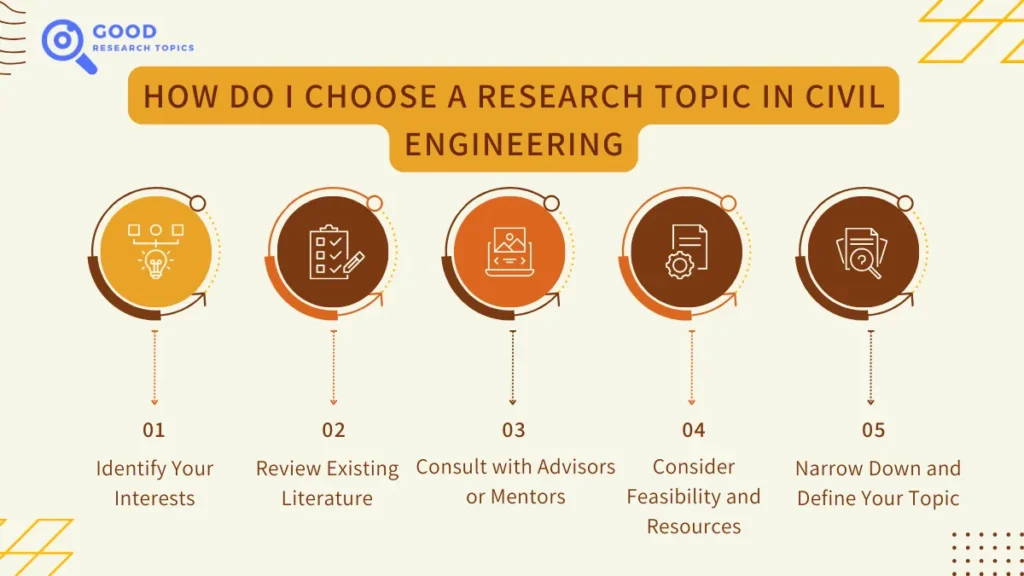
1. Identify Your Interests and Passion
Begin by exploring areas of civil engineering that genuinely interest you. Consider your passion for structural engineering, transportation systems, environmental sustainability, geotechnical engineering, or any other specific field within civil engineering.
2. Assess Current Trends and Challenges
Stay updated with the latest trends, challenges, and advancements in civil engineering. Look into ongoing research, technological innovations, and critical issues faced by the industry to identify potential areas for investigation.
3. Consult with Professors and Professionals
Seek guidance from your professors, mentors, or professionals in the field. Discuss your interests and potential project ideas with them. Their expertise and insights can help you narrow down your options and identify feasible research topics.
4. Review Literature and Existing Research
Conduct a thorough literature review to understand what research has already been done in your area of interest. Identify gaps or areas that require further exploration, building upon existing knowledge, or addressing unanswered questions.
5. Consider Feasibility and Resources
Evaluate the feasibility of your project topics based on available resources, time constraints, and access to necessary equipment or data. Ensure that your chosen topic is realistic within the scope of your academic program.
6. Define Objectives and Scope
Clearly define the objectives and scope of your project. Formulate specific research questions or hypotheses that you aim to address. Ensure that your topic is well-defined and achievable within the given timeframe.
7. Brainstorm and Finalize
After considering all aspects, brainstorm different project ideas and narrow them down based on your interests, available resources, feasibility, and alignment with your academic and career goals. Finally, select a project topic that aligns best with your interests, resources, and academic requirements.
List of Latest And Best Civil Engineering Research Topics For Undergraduates
Here are the following best Civil Engineering Research Topics For Undergraduates Students.
Structural Civil Engineering Research Topics For Undergraduates
- Earthquake-resistant building designs: Advances and innovations.
- Analysis of structural integrity in tall buildings: Wind-induced vibrations.
- Sustainable materials in structural engineering: Evaluating bamboo as a construction material.
- Retrofitting techniques for enhancing the seismic resistance of existing structures.
- Dynamic behavior of bridges under varying loads: Case studies and analysis.
Geotechnical Engineering
- Landslide mitigation strategies in hilly terrains.
- Soil stabilization techniques for improving foundation strength.
- Ground improvement methods in soft soil regions.
- Geotechnical investigation and analysis for tunnel construction projects.
- Impact of soil erosion on infrastructure stability: Prevention and control measures.
Transportation Civil Engineering Research Topics For Undergraduates
- Traffic flow optimization using intelligent transportation systems.
- Sustainable urban transportation planning: Promoting walking and cycling.
- Environmental impacts of transportation infrastructure: Mitigation strategies.
- Innovative designs for mass transit systems in urban areas.
- Integration of autonomous vehicles in transportation networks.
Environmental Engineering
- Water quality assessment and pollution control in urban rivers.
- Sustainable wastewater treatment technologies for small communities.
- Impact of climate change on water resources and infrastructure.
- Analysis of air quality in industrial areas: Health and environmental implications.
- Remediation techniques for contaminated sites: Case studies and innovations.
Construction Engineering and Management
- Lean construction practices: Reducing waste and improving efficiency.
- Building Information Modeling (BIM) applications in construction projects.
- Risk management strategies in civil engineering projects.
- Project scheduling and cost estimation in construction management.
- Innovations in sustainable construction practices: Case studies and best practices.
Water Resources Civil Engineering Research Topics For Undergraduates
- Hydrological modeling for flood prediction and risk assessment.
- Urban stormwater management: Green infrastructure solutions.
- River restoration techniques for ecosystem rehabilitation.
- Water supply and sanitation in rural communities: Challenges and solutions.
- Water conservation strategies in arid regions: Sustainable approaches.
Materials Engineering
- Development of self-healing concrete for infrastructure durability.
- Nanotechnology applications in construction materials.
- Recycled materials in road construction: Performance and sustainability.
- Durability assessment of asphalt pavements under heavy traffic.
- Advanced composite materials in civil engineering: Strength and applications.
Coastal and Ocean Civil Engineering Research Topics For Undergraduates
- Coastal erosion control measures and shoreline protection.
- Renewable energy extraction from ocean waves and currents.
- Offshore wind energy farms: Design challenges and innovations.
- Marine pollution monitoring and management strategies.
- Climate change adaptation for coastal infrastructure: Resilience strategies.
Urban Engineering
- Smart city initiatives: Technology integration for urban development.
- Urban heat island effect mitigation strategies in metropolitan areas.
- Sustainable urban planning: Green spaces and ecological balance.
- Accessibility and inclusivity in urban infrastructure design.
- Retrofitting strategies for improving energy efficiency in existing buildings.
Earthquake Civil Engineering Research Topics For Undergraduates
- Seismic vulnerability assessment of historical monuments and buildings.
- Performance-based seismic design of structures: Case studies.
- Earthquake early warning systems: Efficiency and reliability.
- Retrofitting techniques for bridges and infrastructure in seismic zones.
- Response spectrum analysis in earthquake engineering: Applications and challenges.
Railway Civil Engineering Research Topics For Undergraduates
- High-speed rail technology: Infrastructure design and operational challenges.
- Rail track maintenance and performance enhancement techniques.
- Energy efficiency in rail transportation systems.
- Integration of magnetic levitation technology in railway networks.
- Railway signaling systems and safety measures: Improvements and innovations.
Geographic Information Systems (GIS) in Civil Engineering
- GIS applications for urban planning and infrastructure development.
- Spatial analysis for disaster management and emergency response.
- 3D modeling and visualization in civil engineering projects.
- Land use planning and decision-making using GIS techniques.
- Remote sensing applications in civil engineering: Monitoring and analysis.
Tall Building Design and Construction
- Wind engineering and wind-induced vibrations in tall buildings.
- Sustainable design strategies for skyscrapers.
- Structural fire safety measures in high-rise buildings.
- Performance-based design approaches for supertall structures.
- Façade engineering and innovations in building exteriors.
Hydraulic Civil Engineering Research Topics For Undergraduates
- Hydroelectric power generation: Advances in turbine technology.
- Water distribution network optimization and hydraulic modeling.
- Floodplain management and sustainable flood control measures.
- Hydraulic modeling for irrigation and agricultural water management.
- Urban drainage systems and stormwater management: Efficiency and sustainability.
Structural Dynamics and Earthquake Resistant Structures
- Base isolation and seismic retrofitting techniques.
- Performance-based design for earthquake-resistant structures.
- Vibration control methods for tall buildings.
- Nonlinear dynamic analysis of structures under seismic loads.
- Seismic isolation systems and their effectiveness in building protection.
Smart Materials in Civil Civil Engineering Research Topics For Undergraduates
- Shape memory alloys in structural engineering applications.
- Self-healing materials for infrastructure sustainability.
- Piezoelectric materials for structural health monitoring.
- Phase change materials in building envelope applications.
- Smart sensors and actuators in civil infrastructure: Applications and advancements.
Renewable Energy and Sustainable Infrastructure
- Solar energy integration in buildings and infrastructure.
- Green roofs and sustainable urban infrastructure.
- Energy harvesting technologies in civil engineering.
- Biomass-based energy generation from agricultural waste.
- Life cycle assessment of renewable energy infrastructure: Environmental impacts.
Construction Automation and Robotics
- Autonomous construction equipment and robotics applications.
- 3D printing in construction: Advancements and applications.
- AI and machine learning in construction project management.
- Robotics in bridge inspection and maintenance.
- Automation in prefabrication and modular construction techniques.
Pavement Civil Engineering Research Topics For Undergraduates
- Sustainable pavement materials and design.
- Asphalt recycling and pavement sustainability.
- Pavement management systems for long-term maintenance.
- Performance-based specifications in pavement engineering.
- Analysis of factors affecting pavement roughness and ride quality.
Resilient and Adaptive Infrastructure
- Resilience engineering for climate-resilient infrastructure.
- Adapting infrastructure to rising sea levels and coastal hazards.
- Disaster-resilient communities: Infrastructure design and planning.
- Smart grid technologies for resilient energy infrastructure.
- Infrastructure asset management for long-term resilience.
Non-Destructive Testing and Evaluation
- Ultrasonic testing techniques for concrete structures.
- Ground-penetrating radar applications in civil engineering.
- Infrared thermography in detecting structural defects.
- Acoustic emission testing for monitoring structural integrity.
- Advanced imaging technologies for infrastructure inspection.
Sustainable Development and Green Construction
- Green building certifications: Evaluating their impact on sustainability.
- Circular economy principles in construction and demolition waste management.
- Urban agriculture and green infrastructure integration.
- Eco-friendly construction practices in low-income housing.
- Life cycle analysis of sustainable building materials.
Remote Sensing Applications in Civil Engineering
- Satellite imagery analysis for land use planning and development.
- UAV (drone) technology applications in civil engineering.
- LiDAR technology for terrain mapping and topographic surveying.
- Remote sensing-based monitoring of infrastructure projects.
- Integration of geospatial data for infrastructure development.
Disaster Management and Resilient Infrastructure
- Disaster risk reduction strategies in civil infrastructure.
- Infrastructure resilience to extreme weather events.
- Early warning systems for natural disasters: Effectiveness and challenges.
- Post-disaster recovery and reconstruction planning.
- Community-based disaster management approaches.
Sustainable Transportation Systems
- Low-carbon transportation strategies for urban areas.
- Bicycle infrastructure planning and promotion in cities.
- Electric vehicle infrastructure development and challenges.
- Public transit accessibility and equitable mobility solutions.
- Pedestrian-friendly urban design: Improving walkability.
Urban Resilience and Smart Cities
- Climate-responsive urban planning: Adaptive strategies for cities.
- Resilient housing solutions for informal settlements.
- Big data analytics in urban infrastructure management.
- IoT (Internet of Things) applications for smart city infrastructure.
- Governance and policy frameworks for sustainable urban development.
Water-Energy Nexus in Urban Areas
- Integrated approaches for water and energy conservation in buildings.
- Water-energy-food nexus: Synergies and trade-offs in urban settings.
- Renewable energy integration in water supply and treatment systems.
- Smart irrigation systems for urban agriculture.
- Greywater reuse systems in residential and commercial buildings.
Health and Safety in Construction
- Occupational health hazards in construction: Prevention and management.
- Safety culture development in construction organizations.
- Ergonomics and musculoskeletal disorders in construction work.
- Mental health issues in the construction industry.
- Safety technology innovations for construction site monitoring.
Green Infrastructure and Nature-Based Solutions
- Urban green spaces and biodiversity conservation.
- Rainwater harvesting systems for sustainable water management.
- Green roofs and vertical gardens in urban environments.
- Permeable pavements and their role in stormwater management.
- Urban forests and their impact on climate resilience.
Risk Assessment and Management in Civil Engineering
- Probabilistic risk assessment in infrastructure design.
- Resilience-based decision-making in civil engineering projects.
- Disaster recovery planning and risk mitigation strategies.
- Uncertainty analysis in infrastructure planning and management.
List Of Research Topics In Civil Engineering Pdf
Here are the Best Civil Engineering Research Topics For Undergraduates.
Latest Research Topics in Civil Engineering:
- AI-Enabled Structural Health Monitoring : Using Artificial Intelligence for Predictive Maintenance in Civil Structures.
- Circular Economy Integration in Construction : Implementing Sustainable Practices and Materials in Building Projects.
- Resilient Infrastructure to Combat Climate Change : Designing Climate-Adaptive Structures for Extreme Weather Events.
- BIM and IoT Integration in Smart Construction : Advancements in Building Information Modeling and Internet of Things for Construction Efficiency.
- Green Urban Spaces for Sustainable Cities : Integrating Nature-Based Solutions in Urban Planning for Environmental Benefits.
Simple Research Topics for Civil Engineering Final Year Students
- Study of Sustainable Construction Materials : Analyzing the Environmental Impact of Recycled Materials in Building.
- Traffic Flow Analysis in Urban Environments : Assessing Traffic Patterns and Congestion Solutions in Cities.
- Geotechnical Investigation of Soil Properties : Soil Testing and Analysis for Foundation Design.
- Structural Performance of Building Materials : Comparative Study of Concrete and Steel in Construction.
- Water Quality Analysis of Local Water Bodies : Assessing Pollution Levels and Remediation Strategies.
Research Proposal for Civil Engineering Students
Title: “implementing sustainable practices in urban construction for environmental conservation”.
Introduction: Urbanization and construction activities significantly impact the environment. This research aims to explore sustainable practices in urban construction to minimize environmental degradation.
Objectives:
- Evaluate the Use of Recycled Materials: Analyze the feasibility and effectiveness of integrating recycled materials in building construction.
- Green Infrastructure Assessment: Study the benefits and challenges of incorporating green spaces in urban areas for environmental conservation.
- Energy-Efficient Building Design: Investigate design strategies for reducing energy consumption in urban structures.
- Environmental Impact Analysis: Assess the overall environmental impact of sustainable construction practices on local ecosystems.
- Community Engagement and Awareness: Explore methods to educate and involve communities in promoting sustainable construction practices.
Methodology:
- Literature Review: Analyze existing research on sustainable construction practices.
- Field Studies: Conduct surveys and case studies in urban areas to assess the implementation of sustainable practices.
- Data Collection: Gather data on material usage, energy consumption, and environmental impact.
- Analysis and Recommendations: Evaluate findings and propose recommendations for integrating sustainable practices in urban construction.
Conclusion: The research aims to provide insights into the practical implementation of sustainable practices in urban construction, contributing to environmentally conscious urban development.
This proposed research project aligns with the goal of fostering sustainable urban development by investigating practical approaches to mitigate environmental impact in construction projects.
What Can Be A Good Topic For Research Being A Civil Engineering Student?
As a civil engineering student, selecting a compelling and feasible research topic is crucial. Here are several potential research topics that could be interesting and impactful:
- Smart Cities and Infrastructure : Investigate the integration of technology and sustainable practices in urban planning to create more efficient, resilient, and eco-friendly cities.
- Earthquake-Resistant Building Techniques : Explore innovative methods and materials for designing structures to withstand seismic events more effectively.
- Sustainable Construction Materials : Research the development and application of eco-friendly and durable construction materials, such as recycled aggregates or bio-based materials.
- Traffic Management and Urban Mobility Solutions : Analyze traffic flow patterns, congestion, and propose solutions for efficient transportation systems within cities.
- Water Resources Management : Focus on water conservation strategies, efficient distribution systems, or water quality improvement methods.
- Renewable Energy Integration in Infrastructure : Study the incorporation of renewable energy sources, like solar or wind power, into civil engineering projects for sustainable energy solutions.
- Resilient Infrastructure against Climate Change : Investigate adaptation measures and designs to mitigate the impact of climate change on infrastructure.
- BIM (Building Information Modeling) in Construction : Explore the applications and benefits of BIM technology in improving project planning, collaboration, and efficiency.
- Geotechnical Engineering Studies : Investigate soil stabilization techniques, slope stability analysis, or ground improvement methods for construction projects.
- Waste Management in Construction : Research strategies for reducing construction waste, recycling materials, and implementing sustainable waste management practices.
Civil Engineering Research Topics For Undergraduates span a wide spectrum, offering budding engineers a canvas of innovation and discovery. These topics stand as gateways to unraveling the complexities of infrastructure, environment, and urban development. They encompass critical aspects like structural integrity, sustainable practices, technological integration, and societal resilience.
As budding civil engineers, delving into these research avenues presents an opportunity to amalgamate theoretical learning with practical application. Exploring seismic-resistant designs, sustainable materials, smart infrastructure, or traffic management systems not only nurtures academic growth but also contributes to addressing real-world challenges.
Through meticulous investigation and analysis, undergraduates can influence the trajectory of civil engineering. These topics not only serve as catalysts for academic growth but also sow the seeds of transformative change. Whether it’s devising innovative materials, embracing technology for smarter cities, or fortifying structures against natural calamities, each exploration advances the collective goal of creating a more sustainable, resilient, and efficiently built environment.
What factors should I consider when selecting a research topic in civil engineering?
When choosing a research topic in civil engineering, consider your interests, the current trends in the field, the feasibility of conducting the research within available resources, and the potential impact of the research.
How can I narrow down a broad research area into a specific topic for my undergraduate research project in civil engineering?
To narrow down a broad research area, conduct extensive literature reviews to identify gaps or specific problems within the field.
Related Posts

100+ Most Qualitative Research Topics For High School Students In 2024

100+ Most Interesting Google Scholar Research Topics For Students [Updated 2024]
Leave a comment cancel reply.
Your email address will not be published. Required fields are marked *
Save my name, email, and website in this browser for the next time I comment.
- Interesting
- Scholarships
- UGC-CARE Journals
Top 50 Research Ideas in Civil Engineering
Top 100 Research and Project Ideas in Civil Engineering
Civil engineering is a broad field that requires constant research to improve infrastructure and environmental sustainability. Research ideas in civil engineering can help civil engineers optimize their websites to rank higher on search engine results pages (SERPs) and increase visibility to potential clients. In this article, ilovephd listed the top 50 project and research ideas in civil engineering
Top 50 Research and Project Ideas in Civil Engineering
Here are the top 100 Research ideas in civil engineering:
- Optimization of building information modeling (BIM) for search engines
- Analyzing the effects of traffic on urban air quality
- Evaluating the feasibility of green infrastructure for stormwater management
- Developing sustainable construction techniques for high-rise buildings
- Investigating the effects of climate change on transportation infrastructure
- Analyzing the impacts of natural disasters on infrastructure and the environment
- Developing strategies for recycling construction waste
- Studying the effects of urbanization on biodiversity
- Investigating the role of geotechnical engineering in infrastructure development
- Evaluating the effectiveness of public transportation systems in reducing carbon emissions
- Developing sustainable solutions for wastewater treatment
- Analyzing the effects of water scarcity on infrastructure and the environment
- Investigating the use of renewable energy sources in construction
- Developing methods for reducing noise pollution from infrastructure
- Studying the effects of soil erosion on infrastructure and the environment
- Investigating the use of artificial intelligence (AI) in civil engineering
- Evaluating the feasibility of using drones in construction
- Developing sustainable solutions for pavement design and maintenance
- Analyzing the effects of natural disasters on transportation infrastructure
- Investigating the effects of climate change on water resources
- Developing strategies for improving public perception of civil engineering
- Studying the effects of green roofs on energy efficiency and air quality
- Investigating the use of nanotechnology in civil engineering
- Evaluating the Effectiveness of bridge maintenance strategies
- Developing sustainable solutions for coastal infrastructure
- Analyzing the impacts of construction on nearby communities
- Investigating the use of virtual reality (VR) in civil engineering
- Evaluating the feasibility of using robots in construction
- Developing sustainable solutions for road construction and maintenance
- Studying the effects of land use on transportation infrastructure
- Investigating the effects of land subsidence on infrastructure and the environment
- Developing strategies for improving infrastructure resilience to natural disasters
- Analyzing the effects of climate change on infrastructure materials
- Investigating the use of big data in civil engineering
- Evaluating the effectiveness of sustainable drainage systems (SuDS)
- Developing sustainable solutions for landfill design and management
- Studying the effects of water quality on infrastructure and the environment
- Investigating the Use of blockchain technology in civil engineering
- Evaluating the feasibility of using 3D printing in construction
- Developing sustainable solutions for airport design and management
- Analyzing the effects of seismic activity on infrastructure and the environment
- Investigating the use of augmented reality (AR) in civil engineering
- Evaluating the Effectiveness of sustainable transportation infrastructure
- Developing strategies for improving infrastructure cybersecurity
- Studying the effects of noise barriers on nearby communities
- Investigating the Effects of climate change on coastal infrastructure
- Developing sustainable solutions for railway design and management
- Analyzing the impacts of infrastructure on local economies
- Investigating the use of machine learning (ML) in civil engineering
- Evaluating the feasibility of using prefabrication in construction
In conclusion, The top 50 research ideas in civil engineering cover a broad range of topics, including sustainable construction, green infrastructure, and the use of technology in civil engineering. By incorporating these research ideas into their digital marketing strategy, civil engineers can improve their website’s search engine rankings and reach a wider audience.
Ultimately, the research ideas in civil engineering can help drive innovation and progress in the field toward a more sustainable and resilient future.
Hope, this article would help you know about the research and project ideas and topics in civil engieering. Happy Researching!
- 3D Printing
- airport design
- artificial intelligence
- augmented reality
- biodiversity
- blockchain technology
- civil engineering
- climate change
- coastal infrastructure
- construction waste
- cybersecurity
- geotechnical engineering
- green infrastructure
- high-rise buildings
- infrastructure resilience
- land subsidence
- landfill design
- Machine Learning
- natural disasters
- noise barriers
- noise pollution
- pavement design
- public transportation
- railway design
- renewable energy
- Research Ideas
- seismic activity
- soil erosion
- stormwater management
- sustainable construction
- sustainable transportation
- urban air quality
- wastewater treatment
- water quality
- water scarcity
Most Asked PhD Viva-Voce Questions and Answers
Tips to prepare phd viva-voce presentation slides, birac call for proposals seeks innovative biotech products, most popular, 10 ai software tools to outlining a research paper, 480 ugc-care list of journals – science – 2024, ugc-care list of journals – arts and humanities – 2024, choosing a phd supervisor 9 key factors to consider, 10 ideas to get 10x more google scholar citations, ms word vs latex: which is better to write your phd thesis, top scopus indexed computer science & engineering journals for fast publication – 2024, best for you, 14 best free plagiarism checkers online – 2024, what is phd, popular posts, top scopus indexed journals in aviation and aerospace engineering, popular category.
- POSTDOC 317
- Interesting 259
- Journals 234
- Fellowship 127
- Research Methodology 102
- All Scopus Indexed Journals 91

iLovePhD is a research education website to know updated research-related information. It helps researchers to find top journals for publishing research articles and get an easy manual for research tools. The main aim of this website is to help Ph.D. scholars who are working in various domains to get more valuable ideas to carry out their research. Learn the current groundbreaking research activities around the world, love the process of getting a Ph.D.
Contact us: [email protected]
Copyright © 2024 iLovePhD. All rights reserved
- Artificial intelligence
Thank you for visiting nature.com. You are using a browser version with limited support for CSS. To obtain the best experience, we recommend you use a more up to date browser (or turn off compatibility mode in Internet Explorer). In the meantime, to ensure continued support, we are displaying the site without styles and JavaScript.
- View all journals
Civil engineering articles from across Nature Portfolio
Civil engineering is the design and fabrication of structures for improving the way we live and work and for enabling rapid, safe and high-volume transportation. Examples include building roads, railways, bridges, canals, skyscrapers and factories. Modern civil engineering often places a focus on aesthetic considerations and environmental impact.
Latest Research and Reviews
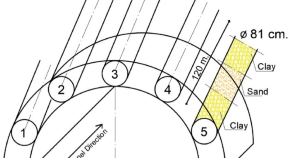
Soft ground micro TBM jack speed and torque prediction using machine learning models through operator data and micro TBM-log data synchronization
- Kursat Kilic
- Owada Narihiro
- Youhei Kawamura
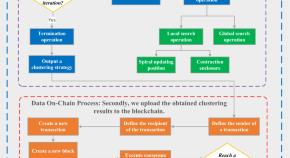
BS-SCRM: a novel approach to secure wireless sensor networks via blockchain and swarm intelligence techniques
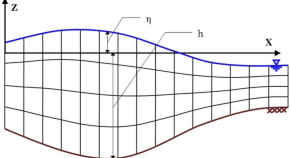
A non-hydrostatic numerical model for simulating regular wave breaking and surf-swash zone motions
- Ali Shirkavand
- Kambiz Farrahi-Moghaddam
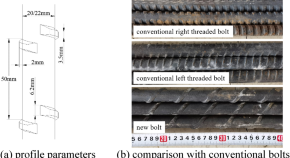
Anchorage performance of a new rebar bolt under different surrounding rock strength and borehole depth
- Baolong Guo

Study on progressive failure mode of surrounding rock of shallow buried bias tunnel considering strain-softening characteristics
- Xiaoxu Tian
- Zhanping Song
- Qinsong Xue
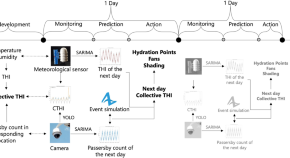
Assessing and forecasting collective urban heat exposure with smart city digital twins
- Dimitris Mavrokapnidis
- John E. Taylor
News and Comment
Advanced transport systems: the future is sustainable and technology-enabled.
Transport has always played a major role in shaping society. By enabling or restricting the movement of people and goods, the presence or absence of transport services and infrastructure has historically been determining for cultures to connect, for knowledge to be shared, and for societies to evolve and prosper, or, in contrast, for societies to decay and fail. Since the beginning of the twenty-first century, transport has been going through a revolution worldwide. One of the primary goals for the transport sector is clear: it needs to be decarbonized and become more sustainable. At the same time, technological advances are shaping the transport sector toward smart services and societies. The Special Collection showcases some of the latest advances in research towards sustainable and technology-enabled transport.
- Sybil Derrible
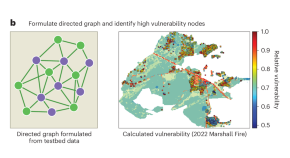
Leveraging epidemic network models towards wildfire resilience
Wildfires have increased in frequency and intensity due to climate change and have had severe impacts on the built environment worldwide. Moving forward, models should take inspiration from epidemic network modeling to predict damage to individual buildings and understand the impact of different mitigations on the community vulnerability in a network setting.
- Hussam Mahmoud
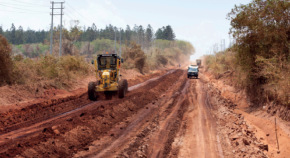
Inclusive and resilient mobility
- Danyang Cheng
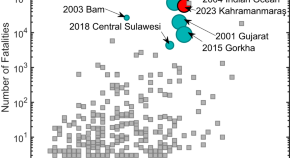
The 2023 Kahramanmaraş Earthquake Sequence: finding a path to a more resilient, sustainable, and equitable society
Learning from the 2023 Kahramanmaraş Earthquake Sequence offers valuable insights into disaster recovery. Carmine Galasso and Eyitayo Opabola delve into the intricacies of the “Build Back Better” (BBB) concept, underscoring the importance of recovery and reconstruction efforts toward a future that is not only more resilient but also more sustainable and equitable.
- Carmine Galasso
- Eyitayo A. Opabola
Material durability, material failure, and material investment—the complexity of concrete
Recent high-profile concrete material failures, including the collapse of parts of public buildings in the UK, have highlighted the need for a greater understanding of the durability of concrete. Here, John Provis explores the need to recognise the complexity of concrete when planning both the research and application of this key construction material.
- John L. Provis
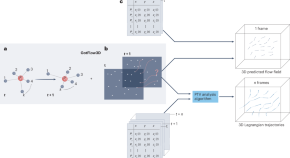
Catching up with missing particles
The implementation of particle-tracking techniques with deep neural networks is a promising way to determine particle motion within complex flow structures. A graph neural network-enhanced method enables accurate particle tracking by significantly reducing the number of lost trajectories.
- Séverine Atis
- Lionel Agostini
Quick links
- Explore articles by subject
- Guide to authors
- Editorial policies
ScholarWorks
Home > Engineering > Civil Engineering > CIVILENG_GRADPROJ
Civil Engineering Graduate Projects and Theses
Theses/dissertations from 2023 2023.
Analyzing the Effects of Rejuvenators in Balanced Mix Design with High Percentages of Recycled Asphalt Pavement , Amanda Jo Mullins
Theses/Dissertations from 2022 2022
Contaminants of Emerging Concern Behavior within Water Renewal Facilities , Joshua C. Baker
Evaluation of Energy Release from Wildfires Across the Elevation Gradient , Isabelle Rose Butler
Use of Harsh-Braking Data from Connected Vehicles as a Surrogate Safety Measure , Nathaniel Patrick Edelmann
Innovative Foundation Alternative Inspired from Tree Roots , Macie Larranaga
Multivariate Analysis of the 2021 Boise Drought in the Context of Natural Human Systems , Jesus Martinez-Osario
Using Food-Industry Byproduct to Treat Expansive Clay , Nicole L. Shaw
Theses/Dissertations from 2021 2021
Developing Implementable Policies Targeting Sustainable Building Construction Through International Policy Diffusion , Melisa Ciara Hancock
Using Differential Shear Strain Measurements to Monitor Crosstie Support Conditions in Railroad Tracks , D. Kody Johnson
Water Quality Responses to a Semi-Arid Beaver Meadow in Boise, Idaho , Luise Bayer Winslow
Theses/Dissertations from 2020 2020
Quantifying the Effects of Climate Change on Pavement Performance Prediction using AASHTOWare Pavement ME Design , Md Shahjalal Chowdhury
In-situ Fluid Injections to Achieve Bio-Stimulated Calcite Precipitation in Expansive Soils , Anish Pathak
Understanding Mesoscopic Chemo-Mechanical Distress and Mitigation Mechanisms of Concrete Subject to ASR , Md Asif Rahman
Assessing the Prevalence of Suspicious Activities in Asphalt Pavement Construction Using Algorithmic Logics and Machine Learning , Mostofa Najmus Sakib
Theses/Dissertations from 2019 2019
Wildfire Smoke: Trends, Challenges, Unknowns, and Human Response , Mariah Dawn Fowler
Full-Scale Study of Infrared Thermography for Assessing Surface and Subsurface Defects in Pavements and Other Civil Infrastructure , Aidin J. Golrokh
Exploring the Use of Data from Newer Technologies in Road Design , Mahamudul Hasan
Effect of Subgrade Conditions on Pavement Analysis and Performance Prediction: A Study for Idaho Conditions , Md Jibon
A Unified Risk-Based Framework for Assessing Sustainability and Resiliency of Civil Infrastructure , Thomas Adam Robbins
Theses/Dissertations from 2018 2018
Feasibility of Aerial Tramway at Boise State University , Majed Alsaqyani
Predicting Power Transformer Bushings' Seismic Vulnerability , Jonathan Bender
Effect of Particle Breakage on Ballast Permanent Deformation — A Study Using the Discrete Element Method , Beema Dahal
Machine Learning Methods to Map Stabilizer Effectiveness Based on Common Soil Properties , Amit Gajurel
Physio-Chemical Degradation of Concrete: A Ramification of Coupled Freeze-Thaw and Sulfate Attack , MD Aminul Islam
Studying the Applicability of Biostimulated Calcite Precipitation in Stabilizing Expansive Soils , Md Touhidul Islam
Effect of Subsurface Conditions on Flexible Pavement Behavior: Non-Destructive Testing and Mechanistic Analysis , Md. Fazle Rabbi
Studying the Use of Microbial Induced Calcite Precipitation as a Shallow Stabilization Alternative to Treat Expansive Soils , Tasria Rahman
Theses/Dissertations from 2017 2017
Subsurface Characterization of Flexible Pavements Constructed Over Expansive Soil Subgrades and Selection of Suitable Rehabilitation Alternatives , Kazi Moinul Islam
Effect of Particle Size Distribution and Packing Characteristics on Railroad Ballast Shear Strength: A Numerical Study Using the Discrete Element Method , S. M. Naziur Mahmud
Evaluating the Effectiveness of a Hybrid Geosynthetic Reinforcement System to Mitigate Differential Heave on Flexible Pavement due to Expansive Subgrades , Mir Md. Tamim
Theses/Dissertations from 2016 2016
Electromagnetically Induced Alteration of Hydraulic Conductivity of Coarse-Grained Soils for Geotechnical Applications , Rakesh Acharya
Evaluating the Suitability of Microbial Induced Calcite Precipitation Technique for Stabilizing Expansive Soils , Sikha Neupane
Evaluating the Effects of Major Assumptions in Layered Elastic Theory on Railroad Track Response Prediction Through the Development of an Improved Track Analysis Software , Sadichchha Sharma
Coupled Numerical Analysis of Variations in the Capacity of an Energy Pile in Clay Soil , Daniel Patrick Zimmerman
Theses/Dissertations from 2015 2015
Impedance-Based Water-Quality Monitoring Using Parallel Plate Method , Ali Nazaridaftari
Theses/Dissertations from 2014 2014
Electromagnetically Induced Remediation of Contaminated Soil , Vahab Bolvardi
The Effect of Electromagnetic Waves on Airflow During Air Sparging , Somayeh Najafi
Dual-State Kalman Filter Forecasting and Control Theory Applications for Proactive Ramp Metering , Brian Richard Portugais
Theses/Dissertations from 2013 2013
Investigation of Human-Induced Land Use Changes Under Present and Future Climate Projections in Southern Idaho , Korri Allen Anderson
Electromagnetic Alteration of Hydraulic Conductivity of Soils , Sahba Azad
An Investigation into the Water Budget and the Management of the Snake River System , John Whitney Hildreth
A New Framework for Flooding Control in Regulated River Systems , Elizabeth Akemi Kanashiro
Theses/Dissertations from 2012 2012
Analysis of Electromagnetic Stimulation of Transport in Water for Geoenvironmental Applications , Mahsa Azad
Theses/Dissertations from 2011 2011
A System Dynamics Approach for Climate Change Impact Analysis in the Snake River Basin , David Jerome Hoekema
Assessing the Surface Energy Balance Components in the Snake River Basin , W Thilini Ajanthik Jaksa
Investigation of Concrete Sealer Products to Extend Concrete Pavement Life , Justin Nielsen
EM Stimulation of Water for Geotechnical Applications , Harlan Dwight Olson Sangrey
Laser Particulate Counter Calibration to a Micro-Orifice Uniform-Deposit Impactor , Benjamen Fredrich Seely
Theses/Dissertations from 2010 2010
Impact of Ground-level Aviation Emissions on Air Quality in the Western United States , Eric Edward Clark
Factors Influencing Soil Moisture at the Hillslope Scale in a Semi-Arid Mountainous Environment , Ivan John Geroy
Identifying Controls on Surface Carbon Dioxide Efflux in a Semi-Arid Ecosystem , Katrina Elsie Ladd
Pharmaceuticals and Personal Care Products in Ground Water from Municipal Lagoon Treatment , Teresa Nicholas
Theses/Dissertations from 2007 2007
Design and Validation of an Automated Multistep Outflow Apparatus for Measuring Soil Hydraulic Properties , Jordi Figueras
Theses/Dissertations from 2006 2006
Integrated Transportation and Land Use Modeling for the Boise Metropolitan Area , Suseel Dev Indrakanti
A Gas Sampling Module for a Subsurface Ion Mobility Spectrometer , Kevin P. Ryan
Theses/Dissertations from 2005 2005
Development of a Queue Growth and Dissipation Model , Wei Wang
Theses/Dissertations from 2002 2002
Changes in Local Groundwater Elevation Following Stream Restoration in the Lower Red River Meadow, Idaho , Kenneth Douglas Donley
- Collections
- Disciplines
- SelectedWorks Gallery
- Albertsons Library
- Division of Research
- Graduate College
Advanced Search
- Notify me via email or RSS
Author Corner
Home | About | FAQ | My Account | Accessibility Statement
Privacy Copyright
ScholarWorks@UMass Amherst
Home > Engineering > CEE > CE_THESES

Civil Engineering Masters Theses Collection
Theses from 2024 2024.
Machine and Statistical Learning for Sustainable Infrastructure and Mobility Systems , Atanas Apostolov, Civil Engineering
Theses from 2023 2023
The Current State of Practice of Building Information Modeling , Kevin P. Brooks, Civil Engineering
Loads Analysis of Fixed-Bottom and Floating Offshore Wind Structures , Michael G. Davis, Civil Engineering
Comparison Of Scaling Performance Between Sidewalks Placed Using Hot and Cold Weather Concreting Procedures , Likhitha Rudraraju, Civil Engineering
CORRELATION BETWEEN LABORATORY TESTING RESULTS AND IN-SITU SIDEWALK SCALING , Brian R. Shea, Civil Engineering
The Effects of Hurricane Wind Field Characteristics on Wind Blade Loads , Michael S. Tsai, Civil Engineering
Post-Fire Damage Inspection of Concrete Tunnel Structures , James Viglas, Civil Engineering
Theses from 2022 2022
Measuring Accessibility to Food Services to Improve Public Health , Efthymia Kostopoulou, Civil Engineering
Euplectella Aspergillum’s Natural Lattice Structure for Structural Design & Stability Landscape of Thin Cylindrical Shells with Dimple Imperfections , Zoe Y. Sloane, Civil Engineering
Theses from 2021 2021
Post-Fire Assessment of Concrete Tunnel Structures , Nicholas C. Menz, Civil Engineering
Utilizing Unmanned Aerial Vehicles (UAVs) for the Estimation of Beam Corrosion of Steel Bridge Girders , Gabrielle Pryor, Civil Engineering
Parametric Study of Integral Abutment Bridge Using Finite Element Model , Asako Takeuchi, Civil Engineering

Theses from 2020 2020
School Bus Routing To Allow Later School Start Times , Rana Eslamifard, Civil Engineering
QUANTIFICATION OF THERMAL BRIDGING EFFECTS IN COLD-FORMED STEEL WALL ASSEMBLIES , Divyansh Kapoor, Civil Engineering
Theses from 2019 2019
Sustainable Travel Incentives Optimization in Multimodal Networks , Hossein Ghafourian, Civil Engineering
High Fidelity Modeling of Cold-Formed Steel Single Lap Shear Screw Fastened Connections , Rita Kalo, Civil Engineering
Modeling the Effect of New Commuter Bus Service on Demand and the Impact on GHG Emissions: Application to Greater Boston , Christopher Lyman, Civil Engineering
Performance of Concrete Tunnel Systems Subject to Fault Displacement , Michael Morano, Civil Engineering
Behavior of Prestressed Concrete Bridges with Closure Pour Connections and Diaphragms , Gercelino Ramos, Civil Engineering
Analysis of Adhesive Anchorage Systems Under Extreme In-Service Temperature Conditions , Rachel Wang, Civil Engineering
Theses from 2018 2018
Driver Understanding of the Flashing Yellow Arrow and Dynamic No Turn on Red Sign for Right Turn Applications , Elizabeth Casola, Civil Engineering
Evaluating the Impact of Double-Parked Freight Deliveries on Signalized Arterial Control Delay Using Analytical Models and Simulation , Aaron J. Keegan, Civil Engineering
Reward Allocation For Maximizing Energy Savings In A Transportation System , Adewale O. Oduwole, Civil Engineering
Impact of S-Curve on Speed in a Modern Roundabout , Akshaey Sabhanayagam, Civil Engineering
All-Red Clearance Intervals for Use in the Left-Turn Application of Flashing Yellow Arrows , Francis Tainter, Civil Engineering
Theses from 2017 2017
Evaluation of New England Bridges for Bat Roosting Including Methodology and Case Studies , Angela Berthaume, Civil Engineering
Evaluating Variances Between Departments of Transportation in New England to Create a Strategic Transportation Workforce , Chelsea Bouchard, Civil Engineering
Development of High Early-Strength Concrete for Accelerated Bridge Construction Closure Pour Connections , Stephanie Castine, Civil Engineering
I. THE HIGH STRAIN RATE RESPONSE OF HOLLOW SPHERE STEEL FOAM; II. THE DYNAMIC RESPONSE OF AN AMERICAN ELM TREE , Ignacio Cetrangolo, Civil Engineering
Performance of Adhesive and Cementitious Anchorage Systems , Mirna Mendoza, Civil Engineering
Theses from 2016 2016
Integrated Solar Technologies with Outdoor Pedestrian Bridge Superstructure Decking , Richard K. Racz, Civil Engineering
LIVE LOAD DISTRIBUTION FACTORS FOR HORIZONTALLY CURVED CONCRETE BOX GIRDER BRIDGES , Mohammed Zaki, Civil Engineering
Theses from 2015 2015
Bonded Anchors in Concrete Under Sustained Loading , Douglas Droesch, Civil Engineering
An Observational Evaluation of Safety Resulting from Driver Distraction , Christina M. Dube, Civil Engineering
Measuring the Resilience of Transportation Networks Subject to Seismic Risk , Mark N. Furtado, Civil Engineering
Nano-Scale Investigation of Mechanical Characteristics of Main Phases of Hydrated Cement Paste , Shahin Hajilar, Civil Engineering
Driver Behavior Evaluation of Variable Speed Limits and a Conceptual Framework for Optimal VSL Location Identification , Curt P. Harrington, Civil Engineering
A Real-time Signal Control System to Minimize Emissions at Isolated Intersections , Farnoush Khalighi, Civil Engineering
Structural Vulnerability Assessment of Bridge Piers in the Event of Barge Collision , David A. Ribbans, Civil Engineering
Towards Sustainable Roundabouts: An Evaluation of Driver Behavior, Emissions, and Safety , Derek Roach, Civil Engineering
Resilience of Transportation Infrastructure Systems to Climatic Extreme Events , Alexandra C. Testa, Civil Engineering
Theses from 2014 2014
Short and Long-term Performance of a Skewed Integral Abutment Prestressed Concrete Bridge , Rami Bahjat, Civil Engineering
Performance of Circular Reinforced Concrete Bridge Piers Subjected to Vehicular Collisions , Nevin L. Gomez, Civil Engineering
Field and Analytical Studies of the First Folded Plate Girder Bridge , Man Hou Sit, Civil Engineering
Theses from 2013 2013
The Effect of Roadside Elements on Driver Behavior and Run-Off-the-Road Crash Severity , Cole D. Fitzpatrick, Civil Engineering
Evaluating At-Grade Rail Crossing Safety along the Knowledge Corridor in Massachusetts , Timothy P. Horan, Civil Engineering
An Evaluation of Alternative Technologies to Estimate Travel Time on Rural Interstates , Qiao Li, Civil Engineering
Operational and Safety-based Analyses of Varied Toll Lane Configurations , Ian A. Mckinnon, Civil Engineering
Preferred Sensor Selection for Damage Estimation in Civil Structures , Matthew Styckiewicz, Civil Engineering
An Evaluation of Drivers’ Cell Phone Use Prevalence and Safety Related Impacts , Keith E. Wenners, Civil Engineering
Theses from 2012 2012
Probabilistic Analysis of Offshore Wind Turbine Soil-Structure Interaction , Wystan Carswell, Civil Engineering
Vehicle Miles Traveled (vmt) Fee Financing Alternatives: Lessons Learned and Future Opportunities , Ashley L. Costa, Civil Engineering
Evaluating and Modeling Traveler Response to Real-Time Information in the Pioneer Valley , Tyler De Ruiter, Civil Engineering
An Optimal Adaptive Routing Algorithm for Large-scale Stochastic Time-Dependent Networks , Jing Ding, Civil Engineering
A Quantitative Analysis of the Impacts from Selected Climate Variables Upon Traffic Safety in Massachusetts , Katrina M. Hecimovic, Civil Engineering
Automated Enforcement Using Dedicated Short Range Communication , Gilbert Kim, Civil Engineering
New Technologies in Short Span Bridges: A Study of Three Innovative Systems , Andrew Lahovich, Civil Engineering
Driver Dynamics and the Longitudinal Control Model , Gabriel G. Leiner, Civil Engineering
Interfacial Strength Between Prestressed Hollow Core Slabs and Cast-in-Place Concrete Toppings , Ryan M. Mones, Civil Engineering
User Equilibrium in a Disrupted Network with Real-Time Information and Heterogeneous Risk Attitude , Ryan J. Pothering, Civil Engineering
Spatial and Temporal Correlations of Freeway Link Speeds: An Empirical Study , Piotr J. Rachtan, Civil Engineering
Evaluation of Live-Load Distribution Factors (LLDFs) of Next Beam Bridges , Abhijeet Kumar Singh, Civil Engineering
Material Characterization and Computational Simulation of Steel Foam for Use in Structural Applications , Brooks H. Smith, Civil Engineering
Varied Applications of Work Zone Safety Analysis through the Investigation of Crash Data, Design, and Field Studies , Erica Swansen, Civil Engineering
Using Micro-Simulation Modeling to Evaluate Transit Signal Priority in Small-to-Medium Sized Urban Areas; Comparative Review of Vissim and S-Paramics Burlington, Vermont Case Study , Joseph C. Tyros, Civil Engineering
Theses from 2011 2011
Evaluating Alternative Toll-Based Financing Approaches: A Case Study of the Boston Metropolitan Area , Rosaria M. Berliner, Civil Engineering
Analysis of Measurement Errors Influence on the Quantitative and Qualitative Results of Car-Following Model Calibration , Mariya A. Maslova, Civil Engineering
Development of Anchorage System for Frp Strengthening Applications Using Integrated Frp Composite Anchors , Geoffrey N. Mcguirk, Civil Engineering
An Application of Spatially Based Crash Analyses and Road Safety Investigations to Increase Older Driver Safety , Deanna A. Peabody, Civil Engineering
Safety and Operational Assessment of Gap Acceptance Through Large-Scale Field Evaluation , Steven Maxwell Tupper, Civil Engineering
Theses from 2010 2010
Historic Bridge Evaluation Using Finite Element Techniques , Helena M. Charron, Civil Engineering
A Quantitative Analysis of the Impacts from Selected Variables Upon Safety Belt Usage in Massachusetts , Samuel W. Gregorio, Civil Engineering
Analysis of Curved Integral Abutment Bridges , Emre Kalayci, Civil Engineering
Material Characterization and Structural Response of Historic Truss Bridges , Sean L. Kelton, Civil Engineering
Earthquake Engineering Simulation with Flexible Cladding System , Jun Jie Li, Civil Engineering
Route Choice Behavior in Risky Networks with Real-Time Information , Michael D. Razo, Civil Engineering
Route Choice Behavior in a Driving Simulator With Real-time Information , Hengliang Tian, Civil Engineering
Investigation of the Behavior of Open Cell Aluminum Foam , Patrick J. Veale, Civil Engineering
Theses from 2009 2009
Computer-Assisted Emergency Evacuation Planning Using TransCAD: Case Studies in Western Massachusetts , Steven P. Andrews, Civil Engineering
Value of Traveler Information for Adaptive Routing in Stochastic Time-Dependent Networks , He Huang, Civil Engineering
Analytical Modeling of Tree Vibration Generated during Cutting Process , Payman Karvanirabori, Civil Engineering
Optimal Adaptive Departure Time Choices with Real-Time Traveler Information Considering Arrival Reliability , Xuan Lu, Civil Engineering
Seismic Energy Dissipation of Steel Buildings Using Engineered Cladding Systems , Quan Viet Nguyen, Civil Engineering
Developing an Evaluation Approach to Assess Large Scale Its Infrastructure Improvements: I-91 Project , Melissa Paciulli, Civil Engineering
Enhancing Concrete Barrier Reflectivity With A Focus On Recycled Glass Aggregate Replacement , Regina Shklyan, Civil Engineering
Theses from 2008 2008
Performance Evaluation Of Existing Steel And Concrete Girder Bridges Through Non-destructive Live-load Testing , Andrew E. Jeffrey, Civil Engineering
Evaluation of Traffic Simulation Models for Work Zones in the New England Area , Pothu Raju Khanta, Civil Engineering
The Application of Traffic Calming and Related Strategies in an Urban Environment , Stacy A. Metzger, Civil Engineering
Terrazzo Cracking: Causes and Remedies , Michael J. Mitchell III, Civil Engineering
Anchorage of Carbon Fiber Reinforced Polymers to Reinforced Concrete in Shear Applications , Carl W. Niemitz, Civil Engineering
Measurement and Computational Modeling of the Mechanical Properties of Parallel Strand Lumber , Russell S. Winans, Civil Engineering
An Evaluation of Simulation Models To Assess Travel Delay In Work Zones , Fan Wu, Civil Engineering
Theses from 2007 2007
An Analysis Of The Saftey Effects Of Crosswalks With In-pavement Warning Lights , George Gadiel, Civil Engineering
The Development of a Dynamic-Interactive-Vehicle Model for Modeling Traffic Beyond the Microscopic Level , Dwayne A. Henclewood, Civil Engineering
A Comparative Evaluation of Crash Data Quality Identification Methods , Arianna M. Mickee, Civil Engineering
Advanced Search
- Notify me via email or RSS
- Collections
- Disciplines
Author Corner
- Login for Faculty Authors
- Faculty Author Gallery
- Expert Gallery
- University Libraries
- Civil and Environmental Engineering Department
- UMass Amherst
This page is sponsored by the University Libraries.
© 2009 University of Massachusetts Amherst • Site Policies
Privacy Copyright
Academia.edu no longer supports Internet Explorer.
To browse Academia.edu and the wider internet faster and more securely, please take a few seconds to upgrade your browser .
Enter the email address you signed up with and we'll email you a reset link.
- We're Hiring!
- Help Center

A Research Proposal on the Success Factors in Civil Engineering (Construction) Projects in Namibia A project paper submitted in part fulfilment of the requirements for the degree in Masters in Business Administration (Project Management

Related Papers
International Journal of Advanced Academic Research
Ayodele Ikudayisi
… SOUTH AFRICA 31 JULY2 AUGUST 2011
Fidelis Emuze
Dr. Amade Benedict
—This study analyzes the results of a survey that aimed at assessing the critical success factors for public sector construction projects in Owerri, Imo State of Nigeria. The effects of the identified critical success factors on public sector construction project delivery were also examined. Data on the study variables were collected via structured questionnaires from fifty six (56) professionals within construction firms located in Owerri, Imo State using the Krejcie and Morgan Method of sampling. Respondents for the study were approached personally to elicit information from using questionnaires and interviews. Various statistical tools such as reliability test using Kaiser-Meyer-Olkin (KMO) measure of sampling accuracy and Barlett test of sphericity were used in determining the accuracy of the method, while factor analysis and linear multiple regression were applied in data analysis and inference using SPSS software. The exploratory factor analysis highlights a specific set of six (6) critical success factors after subjecting sixteen (16) of the initial variables to factor analysis. The six (6) critical success factors include; efficient and effective procurement process/method, effective communication management, adequate planning, leadership skills of the project manager, weather conditions, and effective coordination of project activities. The results of the findings after subjecting the six (6) identified critical success factors to regression revealed that adequate planning had a significant impact on the success of public sector construction projects, while the remaining five (5) factors did not explain any significant variance in the success of public sector construction project delivery. The findings from this study contributes to the public sector construction project critical success factors literature by conceptualizing more on leadership skills of the project manager, effective management of communication and most importantly the provision of adequate planning in terms of schedule, and cost as a multidimensional construct for public sector construction projects success.
Ayodeji E Oke
Over the years, performance of construction projects has become an issue of concern not only to contractors and professionals but other stakeholders including clients, project sponsors and end-users. This is due to complexity of construction process, innovation in the use of raw materials and machinery, new construction management techniques and more importantly, variation in requirement from clients. Thus, this research evaluates factors affecting performance of construction projects from the perspective of consultants and contractors, in order to enhance the quest of construction industry of contributing positively to the economy and overall growth of the nation. Using quantitative approach, data were collected through close-ended questionnaires administered on a group of learned and experienced consultants and contractors who are based within the study area. From the analysed data, there is a significant difference in the perceptions of consultants and contractors regarding factors affecting performance of construction projects. To consultants, general time factors and conformance to specification are the most important performance indicator for project success while from contractors' view, cost factors including delay in payment from owner to contractor is a major critical success factor. The two groups unilaterally agreed that bringing about the best planning and scheduling technique before and during construction would assist in improving performance of construction projects in the country.
Tasarım + Kuram
SEMA ERGÖNÜL
Civil Construction Project Management
precious emmanuel
Civil Construction Project Management has been so relevant in the actualizing of Civil Projects which in turn expands development in societies. Innovation in construction techniques has also relieved stress in Project execution. Management in Civil Construction can not be over emphasized in the modern advancement of technology as it helps to pursue human safety, human productivity, monitoring and execution of projects in time, and management of cost. This makes this topic essential in Civil Engineering.
Proceedings of International Structural Engineering and Construction
Samuel A D E N I Y I Adekunle
Achieving project success remains the aim of every project sponsor. The sponsor engages different professionals in the built environment to this end. However, unforeseen factors modify agreed terms, causing delay and leading to loss of time and money. Delay causes an overrun of cost and time having a heavy financial burden on the client and other stakeholders involved in the project. Most times, the contractor is always the focus when this happens. At many other times, other stakeholders, who failed in their obligations, only surface after a study of the contract conditions is carried out. Thus, this study examines project performance in the construction industry in Nigeria, but from a contractor’s perspective. The study adopts a survey research design. A total number of 75 questionnaires were administered to contractors, who were members of the Federation of Construction Industry and other private sector organizations, but 37 were successfully retrieved and analyzed. The result sho...
Opeyemi E Oluwatuyi
This study was carried out to identify the factors influencing the performance of construction projects in Akure, Nigeria. A questionnaire survey was conducted and forty six (46) factors were identified, categorized into eight (8) groups, evaluated and ranked according to participants’ perspectives. Fifty (50) questionnaires were distributed as follows: 12 to clients, 18 to consultants and 20 to contractors. The outcome of these analyses showed that all the respondents agreed that construction projects were influenced by all the forty six factors indicated by the questionnaire. However, the analysis indicated that the top ten (10) factors that have the highest average index showed how these factors are affecting construction projects. Based on these findings, this study recommended that contractors’ progress payment should be made on time as well as minimizing change orders during construction to avoid delays. Also, consultants should give full commitment to monitor the project progress and ensure the work was according to specifications and satisfactory quality; meeting owner needs and expectation within the project budget and stipulated time. Finally, continuous coordination and relationship between project participants were required through the project life cycle in order to ensure project performance.
Quality of projects is one of the traditional and global measure of project performance. For construction projects, the goal and desire of clients, contractors and consultants is to ensure that projects are delivered according to acceptable and agreed standards. In this study, various factors affecting performance quality of construction projects were examined with a view to suggesting improvement measures. Using various variables from relevant literature as the basis, data were obtained through the use of questionnaire administered on contractors, architects, engineers, quantity surveyors as well as project and construction managers. It was discovered that major factors affecting performance quality of construction projects in the study area are related to the use of unskilled and incompetent trade contractors. More so, there is poor on-site supervision and lack of commitment by supervising team shouldered with the responsibilities of ensuring compliance to approved standard. Other issues are related to poor planning and scheduling as well as inadequate knowledge, training and skills of construction workmen. To minimize the impact of these factors and improve performance quality of construction projects, proper and modern construction equipment, techniques and methods should be adopted by construction firms, there should be proper site management and supervision to ensure conformance with drawings and specification and adequate project duration should be allocated and stated in the contract documents.
Information Management and Business Review
adrien FARIALA
The success of the Government's construction projects in the Democratic Republic of Congo (DRC) since 2011 has been anchored on the potential of construction firms in completing these projects based on the planned timeframe as well as the budget. Consequently, from a project management viewpoint, the main objective of the present study was to assess the critical success factors in developing countries' construction projects and to examine the impact of risk management, leadership, experience and expertise, and project size on construction projects in DRC. Data was gathered from respondents in the construction projects in DRC using quantitative methods. A statistical software program, SPSS version 25, was subsequently used to analyze the collected quantitative data. The findings emanating from this study contribute to the body of knowledge on key success factors in construction projects in DRC as a developing country. It was revealed from the study that the success of constru...
RELATED PAPERS
Veterinary Medicine International
Enyiew Alemnew
Iranian biomedical journal
Soudeh Ghafouri-Fard
Deterjen Cair Untuk Mesin Cuci Pasar Anyar, Call 0896-3305-7580
deterjen laundry cair bandung
Forum Médical Suisse ‒ Swiss Medical Forum
Andreas Gerber
Brazilian Journal of Development
Luciana Fabiano
Shinji Tsuruoka
Armand Attia
Encyclopedia of Artificial Intelligence
Ernesto Luis Malta Rodrigues
Revue Neurologique
mohamed ndiaye
Olga marčič
Regine Kwaw
Journal of NeuroEngineering and Rehabilitation
Fuminari Kaneko
Romanian Journal of Medical Practice
Mihaela Vilcu
Recherches en éducation
Paul LEHNER
Orvosi Hetilap
I. Tiringer
Geophysical Research Letters
Aaron Breneman
Belinda Mariño , Andrés Chazarra
BIO Web of Conferences
Aneliya Georgieva
caglayer A.S Izmir
uthman yahya
Deep Sea Research Part I: Oceanographic Research Papers
Nadine Le Bris
Anais do I Congresso Brasileiro On-line de Pesquisas e Inovação em Educação
Suzy Cristina Pedroza da Silva
Frontiers in Marine Science
Les Kaufman
jean-marie verpoorten
Yaroslav Kuzmin
- We're Hiring!
- Help Center
- Find new research papers in:
- Health Sciences
- Earth Sciences
- Cognitive Science
- Mathematics
- Computer Science
- Academia ©2024
How to Write a Civil Engineering Proposal + 7 Pro Tips
- AEC Marketing
- Educating and Informing
Posted by: Cinthya Soto
Crafting a civil engineering proposal can be an overwhelming task, given its critical role in securing projects and laying the groundwork for successful project execution. However, if you know how to write a civil engineering proposal and implement the right software, creating a winning RFP response becomes efficient and easy.
In this blog, we teach you the essentials of writing a compelling and comprehensive proposal that stands out to clients. We also highlight the importance of why proposal software isn’t just an option, but a necessity.
Plus, to give you an edge, we’ve compiled seven professional tips that go beyond the basics—strategies that seasoned professionals use to elevate their proposals from good to exceptional.
Why Are Civil Engineering Proposals Important?
Civil engineering proposals are essential for participating in the bidding process for new projects. They provide a detailed plan of the project’s scope, methodology, and costs, which helps potential clients evaluate the feasibility and efficiency of the team undertaking the project.
Ultimately, crafting a winning civil engineering proposal can help you win more business and help your AEC firm grow. In fact, RFP-influenced revenue rose 6% between 2022 and 2023.
What Should Be Included in a Civil Engineering Project Proposal?
Creating a civil engineering project proposal requires a structured approach to ensure all necessary details are covered comprehensively. Here’s what should be included in such a proposal:
Executive Summary
The executive summary serves as the proposal’s forefront, offering a concise overview of the project at hand. It should articulate the project’s purpose, its overarching goals, and the significant benefits it aims to deliver.
This section should act as the proposal introduction . Therefore, it should have a compelling hook, designed to capture the interest of the reader by highlighting the proposal’s relevance and the unique value proposition of the engineering team.
It sets the stage for the detailed exposition that follows, ensuring that the reader understands the proposal’s importance and the transformative potential of the project.
Define the Project Scope
Defining the project scope involves describing the boundaries of the project, outlining what will be accomplished, and what will fall outside the project’s scope. This section should address the identified needs or problems the project aims to solve, providing a clear picture of the expected outcomes.
By detailing the project’s scope, the proposal ensures that all stakeholders have a shared understanding of the project’s limits and possibilities, helping manage expectations and focus efforts on the agreed-upon goals.
Set a Budget
Setting a budget is crucial for outlining the financial plan of the project. This section should include a detailed breakdown of all estimated costs, including:
- Labor
- Materials
- Equipment
- Any contingencies
It is important to justify each cost element, showing how the allocated funds will contribute to the project’s objectives. A well-justified budget not only demonstrates the proposal’s financial feasibility but also reflects the team’s thorough planning and understanding of the project’s financial requirements.
Determine a Timeline
A detailed timeline is essential for demonstrating the project’s schedule and milestones. This section should map out the phases of the project, from start to finish, with start and end dates for each critical task.
It should also highlight key milestones and their significance to the project’s overall timeline. A clear, well-structured timeline ensures that all stakeholders have realistic expectations about the project’s duration and can plan accordingly.
Moreover, a timeline illustrates the team’s commitment to meeting deadlines and efficiently managing the project’s progression.
Follow the Project Plan and Requirements
The project plan is a comprehensive section that lays out the specific objectives, requirements, and deliverables of the project. It should detail the technical and operational strategies to be used, the criteria for success, and how the project aligns with the client’s objectives.
This portion of the proposal demonstrates the team’s approach to achieving the project’s goals, outlining the methodologies, technologies, and standards that will be applied. It’s where the engineering team’s expertise and innovative solutions are showcased, providing confidence in their ability to deliver the project successfully.
Create a Compelling Project Proposal
With all the essential information and specifics at hand, the next step involves writing a compelling civil engineering proposal. Remember to articulate the goals, advantages, and projected timeline of the project with clarity, alongside outlining possible challenges and the approaches to solve them.
Moreover, highlight your proficiency and experience, drawing attention to your previous accomplishments to reinforce trust in your capability to achieve the desired outcomes.
7 Tips for a Civil Engineering Proposal That Wins Business
However, if you’re still unsure about how you can create a civil engineering proposal that wins more business, here are some tips you can follow to help you create your proposals with confidence:
1. Collaboration Between Civil Engineers and Marketers
Collaboration between civil engineers and marketers or proposal writers is crucial for crafting a winning proposal.
Why? Civil engineers bring technical expertise, ensuring the proposal is based on feasible engineering practices and solutions while marketers or proposal writers contribute by refining the message, emphasizing the benefits, and making the proposal appealing to a non-technical audience.
This team effort ensures the proposal is both appealing to the reader and explains the solution compellingly. This effectively communicates the project’s value proposition.
2. Select the Right Team Members
The success of a civil engineering project is largely dependent on the expertise, coordination, and collaboration of its project team.
Therefore, include a section that outlines the team responsible for bringing the project to life. Detail their roles, responsibilities, and qualifications in their employee RFP resumes to ensure the client you’ve selected the best employees with the right expertise for the project.
How can you avoid spending hours on this section while creating efficient employee resumes? With a Digital Asset Management (DAM) tool for engineering that has an Employee Module .
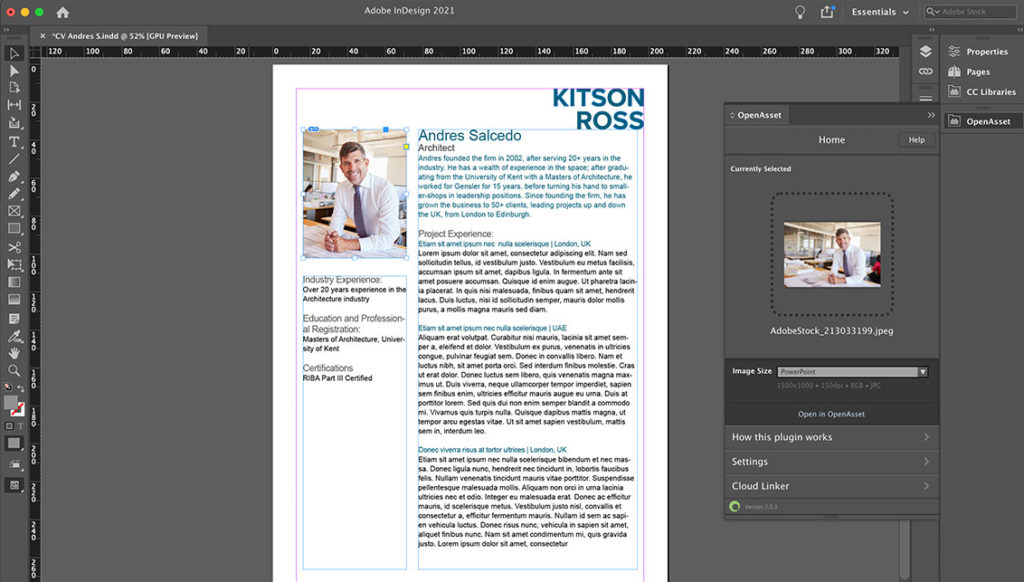
Your team’s resumes go beyond summaries of qualifications—they are powerful documents that highlight your team’s capabilities. OpenAsset , a DAM solution tailored for the AEC industry, makes the task of crafting optimal RFP resumes more efficient than before.
Using OpenAsset’s dedicated Employee Module, you’re not just building a resume; you’re creating a narrative. It allows you to showcase the depth of your team’s expertise, from the experienced architect with a portfolio of landmark projects to the innovative young engineer with groundbreaking ideas, emphasizing that every detail counts.
Moreover, the Employee Module enhances your organization’s productivity by streamlining the generation of resume documents and enabling seamless synchronization of employee information between OpenAsset and your CRM or ERP systems.
3. Create a Checklist
Creating a checklist of all required elements is a strategic approach to ensure your proposal is comprehensive and doesn’t miss anything critical. This checklist should include:
- Project objectives
- Scope of work
- Methodology
- Timeline
- Budget
- Qualifications of the project team
- Any client-specific requirements
This checklist helps in addressing each component, ensuring thoroughness and adherence to RFP requirements.
4. Double-Check Your Work
Having another set of eyes review your proposal can make a huge difference in the success of your proposal. This can be someone within your team or an external reviewer who can provide a fresh perspective.
They can catch errors, offer suggestions for improvement, and ensure that the proposal is clear and persuasive. This peer review process is crucial for enhancing the quality and effectiveness of your proposal.
5. Have Strong Communication With Your Team
Effective communication within your team about deadlines and workload distribution is essential for managing the proposal development process efficiently. Setting clear expectations and regular check-ins can help ensure that all components of the proposal are progressing as planned and that any challenges are addressed right away.
Additionally, this proactive communication builds teamwork and ensures that the proposal is completed on time and to a high standard.
6. Turn Your Weaknesses Into Your Strengths
Acknowledging and addressing your firm’s perceived weaknesses can actually enhance your proposal’s appeal. Instead of hiding them, strategically transform these aspects into strengths by demonstrating proactive measures and innovative solutions.
For example, if your firm lacks experience in a specific area, emphasize your fresh perspective, adaptability, and the cutting-edge techniques you bring to the table. Highlight partnerships with more experienced consultants or the specialized training your team has undertaken.
This approach shows potential clients that your firm is not only aware of its limitations but is also committed to growth, learning, and excellence, turning potential vulnerabilities into compelling reasons for selection.
7. Know When to Let Go of a Proposal
Recognizing when a project is not the right fit for your firm is crucial when it comes to any AEC proposal. Investing time and resources into bids with slim chances of success can drain your team’s energy and divert attention from more attainable opportunities.
Develop criteria for evaluating the feasibility and alignment of each RFP with your firm’s strengths, experience, and strategic goals. To do so, you can establish a go/no-go process to help you determine whether a business opportunity is worth the effort. If an RFP doesn’t align well, it might be wiser to pass and focus on opportunities where your firm can truly excel and deliver value.
Understanding when to let go frees up resources to concentrate on proposals that are not just winnable but also rewarding, allowing you to apply your efforts where they can make the most impact.
Software to Make Civil Engineering Proposals Easier
Implementing proposal software results in greater team satisfaction. However, that’s only one of the many advantages of using proposal software, like a DAM.
The primary advantages of using proposal software include enhanced proposal quality, improved accuracy in responses, and quicker response times to RFPs. That must be why, according to Webinarcare’s RFP statistics , 69% of organizations utilize such tools or software.
In fact, according to the same study, teams that use software have an average 45% proposal win rate. On the other hand, teams that do not utilize software for their RFP processes have an average win rate of 41%.
If you’re still not convinced of the importance of using specialized software for your civil engineering proposals, teams utilizing proposal software have an average annual influence on revenues of $405.2M, in contrast to those not using software, which influence $245.1M annually. This represents an average revenue increase of 65% .
Using DAM software, like OpenAsset, provides a streamlined approach to managing and utilizing digital assets such as images, documents, and project data. OpenAsset stands out as the top software solution designed to simplify the process of creating civil engineering proposals because it’s specifically tailored for the AEC industry.
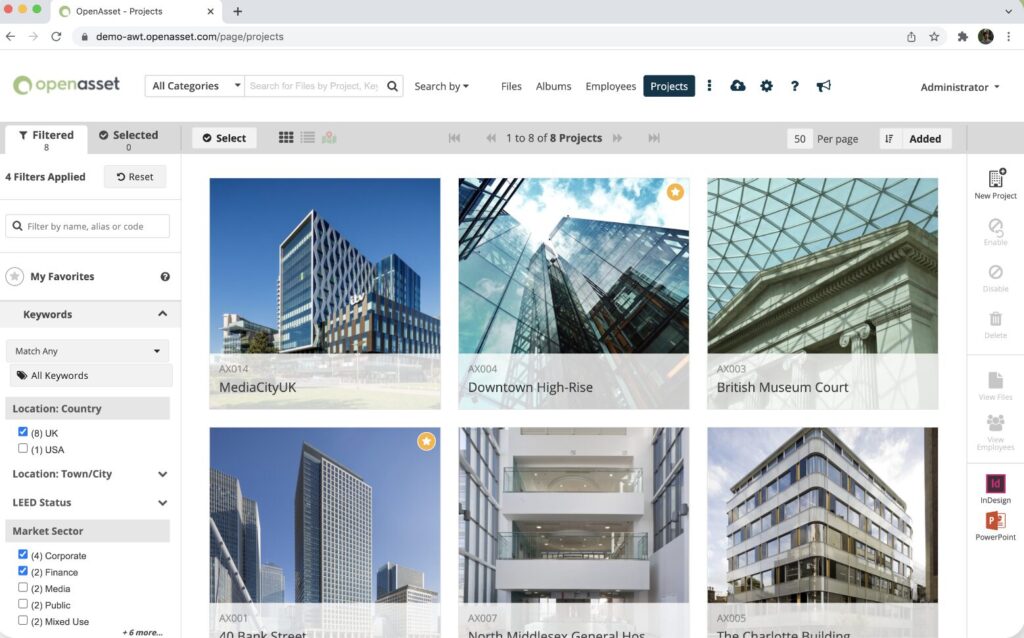
This means it offers capabilities that are particularly beneficial in enhancing the efficiency and effectiveness of AEC proposal creation. To name a few of these capabilities, they include:
- A centralized repository
- Customizable templates
- An Employee Module
- Integration with AEC-specific tools
- Easy sharing and collaboration
FAQs: Responding to Civil Engineering RFPs
Here are some common FAQs to help you throughout your civil engineering proposal process:
Do Civil Engineers Write Proposal Responses?
Yes, civil engineers often write proposal responses, especially in firms where they play a pivotal role in project planning and execution. These professionals leverage their technical expertise and understanding of project requirements to craft detailed proposals that address the scope, methodology, and execution plan.
However, typically in larger organizations, a team that includes civil engineers along with the firm’s marketing team and a dedicated proposal writer/s may collaborate to prepare the response, ensuring that it has all the right content and meets the RFP’s requirements.
What’s the Best Way to Structure a Civil Engineering Proposal?
The best way to structure your civil engineering proposal is to include:
- An Executive Summary/ Introduction
- Project background
- Team qualifications
- Detailed project plan
What Mistakes Should I Avoid in Civil Engineer Proposals?
Knowing what to do when crafting your civil engineering proposals is just as important as knowing what not to do. Some common mistakes to avoid include:
- Underestimating the importance of clarity and detail, particularly in explaining technical approaches and methodologies
- Overlooking the need to tailor the proposal to the specific client and their project
- Failing to justify the budget and timeline
- Not doing enough proofreading
- Failure to highlight the team’s qualifications and past successes
These mistakes can raise concerns about project feasibility and reliability and might undermine the proposal’s persuasiveness. Avoiding these pitfalls can significantly increase the chances of your proposal being successful.
Civil Engineering Proposal Example
At OpenAsset, our goal is to equip you with the tools necessary for achieving success. To support you on this path, we offer an engineering project proposal template that can be used for your civil engineering proposals. It’s designed to enhance your proposal crafting process.
Additionally, you can see an example of what a civil engineering proposal should look like below:
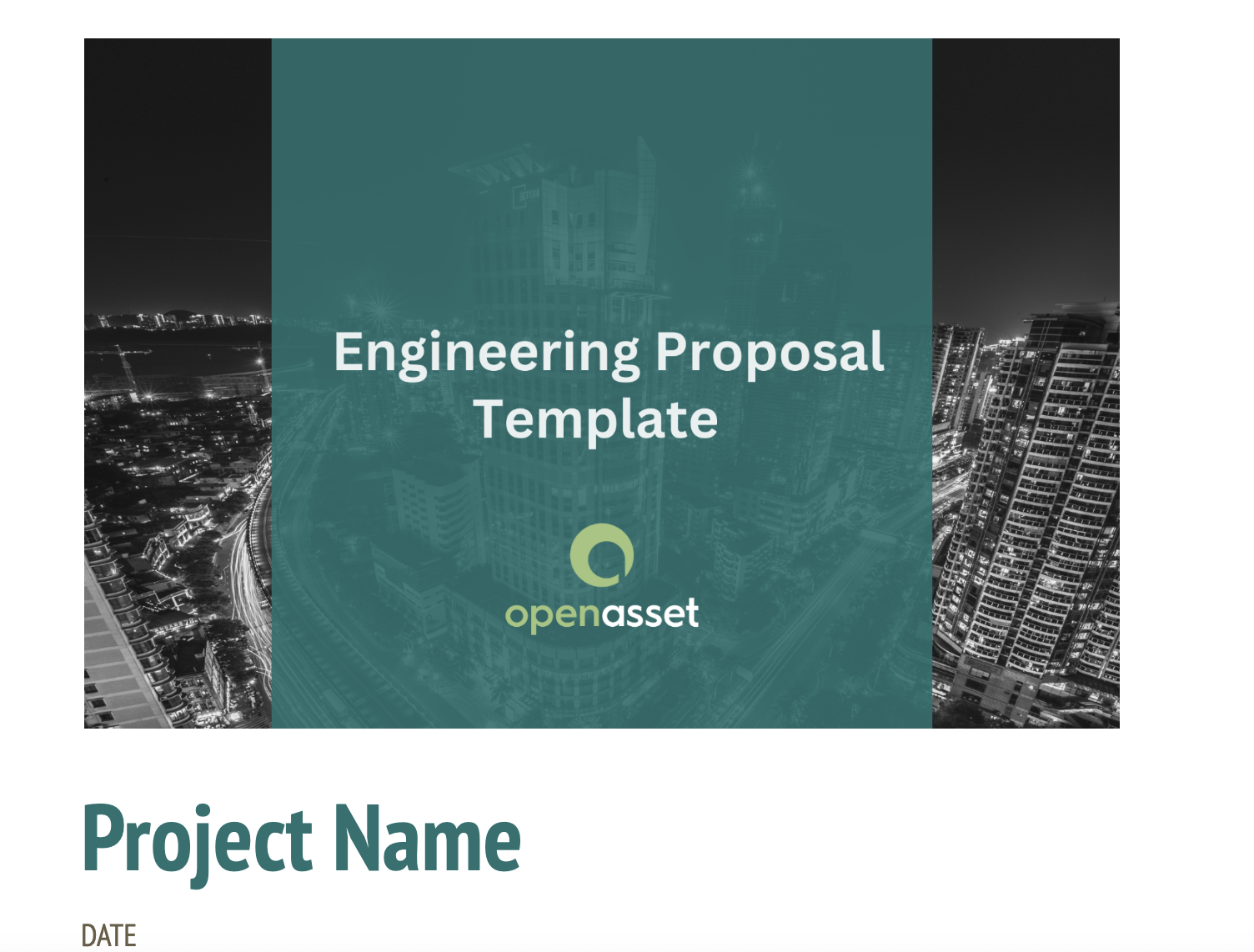
Create Successful Civil Engineering Proposals With OpenAsset
OpenAsset , a leading Digital Asset Management (DAM) solution designed specifically for the architecture, engineering, and construction industries, offers a robust platform that simplifies the proposal creation process, enabling you to produce compelling, comprehensive proposals with ease.
Implementing OpenAsset into your proposal development workflow gives you access to a suite of features that streamline the management of digital assets, automate document creation, and ensure your proposals are both visually appealing and rich in content.
This not only saves valuable time but also enhances the quality of your submissions, allowing your projects’ strengths and your team’s expertise to stand out.
Ultimately, OpenAsset’s DAM solution makes AEC proposals simpler, faster, and more successful. That’s why 99% of customers renew. With OpenAsset, your journey towards creating winning civil engineering proposals is just a few clicks away.
Ready to streamline your workflows?
[Closing CTA: Schedule a Demo]
Get OpenAsset DAM Insights

How to Create Winning Proposals
What to read next.

Engineering Lead Generation: 8 Strategies + 5 Tips
Mastering B2B lead generation is a crucial yet challenging task for engineering firms. In fact, 61% of B2B marketers say high-quality leads ...
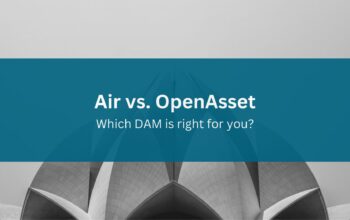
Air vs. OpenAsset
Choosing the right Digital Asset Management (DAM) system can be a game-changer for businesses aiming to streamline their digital asset organ...

OpenAsset Achieves Best Meets Requirements Award in G2 Report
OpenAsset is proud to announce that our Digital Asset Management (DAM) software has achieved the Best Meets Requirements Small-Business Awar...
- How it works
Useful Links
How much will your dissertation cost?
Have an expert academic write your dissertation paper!
Dissertation Services

Get unlimited topic ideas and a dissertation plan for just £45.00
Order topics and plan

Get 1 free topic in your area of study with aim and justification
Yes I want the free topic

Construction Engineering Dissertation Topics
Published by Carmen Troy at January 5th, 2023 , Revised On August 18, 2023
Introduction
The development in construction engineering has significantly influenced the way our society has grown over the last few decades. Recent research in sustainable construction has been much emphasized in the civil engineering industry. The world is now moving towards systems that are considered adaptable, sustainable, viable, and environmentally friendly.
Many developed countries, including the United Kingdom, have developed pathways towards this future in Vision 2030 and even 2050. There are various exciting research opportunities for students when selecting their construction engineering dissertation topic .
To help you get started with brainstorming for construction engineering topic ideas, we have developed a list of the latest topics that can be used for writing your construction engineering dissertation.
These topics have been developed by PhD-qualified writers of our team , so you can trust to use these topics for drafting your dissertation.
You may also want to start your dissertation by requesting a brief research proposal from our writers on any of these topics, which includes an introduction to the topic, research question , aim and objectives , literature review along with the proposed methodology of research to be conducted. Let us know if you need any help in getting started.
Check our dissertation examples to get an idea of how to structure your dissertation .
Review the full list of dissertation topics for 2022 here.
2022 Construction Engineering Dissertation Topics
Topic 1: the impact of virtual reality on enhancing customer experience and decreasing on-site visits to construction projects.
Research Aim: The aim is to evaluate the impact of virtual reality on enhancing customer experience and decreasing on-site visits to construction projects
Objectives:
- To understand the significance of incorporating VR in the UK construction projects
- To analyse the effect of VR on enhancing customer experience
- To examine the impact of VR on reducing the number of on-site visits
Topic 2: The incorporation of AI in UK based construction projects to forecast costs accurately and mitigate safety and productivity issues
Research Aim: The aim focuses on to examine how the incorporation of AI in the UK construction projects can help in forecasting costs accurately and mitigating safety and productivity issues
- To explore the significance of incorporating AI in construction projects
- To evaluate how forecasting of costs can be done accurately with the incorporation of AI in the UK construction projects
- To understand how safety and productivity issues can be mitigated effectively with the integration of AI in the UK construction projects
Topic 3: The impact of workforce restrictions and supply chain disruptions due to the coronavirus pandemic on the growth of the UK construction sector
Research Aim: The research aim concentrates on to explore the impact of workforce restrictions and supply chain disruptions due to the coronavirus pandemic on the growth of the UK construction sector
- To evaluate the different impacts of coronavirus pandemic on the UK construction sector
- To determine how supply chain disruptions due to the pandemic has influenced the growth of the UK construction sector
- To examine how workforce restrictions due to this pandemic have impacted the growth of the UK construction sector
Topic 4: The importance of five elements of Business Information Modeling and how these elements of BIM are minimising operation costs and increasing the productivity in UK construction projects
Research Aim: The aim is to evaluate the importance of five elements of Business Information Modeling and how these elements of BIM are minimising operation costs and increasing the productivity in the UK construction projects
Objectives :
- To understand the Business Information Modeling and its five elements
- To determine how these elements of BIM are minimising operation costs in the UK based construction projects
- To examine how these elements of BIM are increasing the productivity in the UK based construction projects
Topic 5: An examination of different ways through which a site waste management plan in the UK construction projects helps in using recyclable products and mitigating contamination
Research Aim: The research aim explores different ways through which a site waste management plan in the UK construction projects helps in using recyclable products and mitigating contamination
- To examine the importance of the site waste management plan in the UK construction projects
- To determine how an efficient site waste management plan can help in recycling waste products
- To evaluate how an efficient site waste management plan can aid in mitigating contamination
Covid-19 Civil Engineering Research Topics
Construction engineering after coronavirus: identify the consequences of covid-19 on construction engineering in the uk or any country of your choice..
Research Aim: This research will focus on identifying the impacts of Coronavirus on construction engineering in the selected country.
Research to study the damage caused to the construction projects due to the lack of workers on site.
Research Aim: This study will focus on identifying the damage caused to construction projects as the workers are staying away from the sites. What measures are taken to complete these projects and recover the loss?
Contractors and Builders after Covid-19: business industry, tender opportunities, and planning to continue business.
Research Aim: This research aims at identifying the conditions faced by contractors and builders. What is their plan to deal with the COVID-19 crisis? How did it affect the business industry and tender opportunities?
Cite Operating Procedures: research the various safety measures for workers, contractors, and engineers working on construction sites.
Research Aim: This research is conducted to know about various safety measures taken by the government and private organisations for workers, contractors, and engineers working on construction sites.
Investigate how civil engineers are working from home: Identify whether remote working can be a long-lasting solution to recover the loss caused by Covid-19.
Research Aim: Remote working has emerged as a ray of hope for mechanical engineers amid this pandemic. This research will focus on the advantages and disadvantages of remote working and also answer the question of whether it is a long-lasting solution or not.
Research to study the economic and labour crisis as a result of Coronavirus.
Research Aim: This research will focus on the financial loss and labour crisis caused due to the outbreak of the Coronavirus pandemic.
Research to study the disruption of the supply chain, shortage of contractors, workers, and material, cancellation of contracts due to COVID-19
Research Aim: This research will focus on identifying the disruption of the supply chain, shortage of contractors, workers, and material, cancellation of contracts due to COVID-19.
Research to throw the light on the future of the construction Industry after the Coronavirus pandemic.
Research Aim: This research will predict how the construction industry will transform after the COVID-19 pandemic. What challenges it may face, and what could be the possible ways to meet those challenges?
- Utilization of renewable energy resources in the development of sustainable homes
- Sustainability and its impact on societies; Visualizing a constructive future.
- Achieving sustainability from properties of concrete; Analyses of the recent research and developments.
- The lean manufacturing techniques and the role of management in construction
- Construction Safety; is there a need to revise or re-model the practices/legislations, reviewing the accidental trends and role of legislations?
- Multilingual safety in construction; reviewing the current industrial practices and the need to improve, highlighting the actual issues of migrant workers in the construction industry
- Analysis of the impact of the latest technology in the construction Industry
- The role of Business Information Modelling (BIM) in the Construction Industry; assessment of practices, management, and productivity through such computer-aided tools
- Procurement techniques; analyses of the most suited procurement strategies in the construction industry
- Is there a need for an integrated model that can replace all other management tools? Review of how the construction industry can be revolutionized through the use of state of the art computer-aided techniques
- Construction Management; highlighting the best practices in the modern construction projects
- Zero carbon structures; use of technology to develop zero carbon buildings
- Waste minimization in construction projects; identifying the best practices
- Use of Waste in constructions; how demolition can be modelled to construct new structures
- Construction materials analyses; timber, steel, or concrete? Investigation of materials for optimum material’s utilization
- Design of Effective ventilation systems in high rise buildings
Also Read: Mechanical Engineering Dissertation Topics
Note: Some of these topics may require students to undertake primary research, which includes developing questionnaires, survey forms, and interviews, whilst others are based on desk-based research.
How Can ResearchProspect Help?
ResearchProspect writers can send several custom topic ideas to your email address. Once you have chosen a topic that suits your needs and interests, you can order for our dissertation outline service , which will include a brief introduction to the topic, research questions , literature review , methodology , expected results , and conclusion . The dissertation outline will enable you to review the quality of our work before placing the order for our full dissertation writing service !
Important Notes:
As a construction engineering student looking to get good grades, it is essential to develop new ideas and experiment on existing construction engineering theories – i.e., to add value and interest in your research topic.
The field of construction engineering is vast and interrelated to so many other academic disciplines like civil engineering , chemical engineering , mechanical engineering , engineering and more. That is why it is imperative to create a construction engineering dissertation topic that is articular, sound, and actually solves a practical problem that may be rampant in the field.
We can’t stress how important it is to develop a logical research topic; it is the basis of your entire research. There are several significant downfalls to getting your topic wrong; your supervisor may not be interested in working on it, the topic has no academic creditability, the research may not make logical sense, and there is a possibility that the study is not viable.
This impacts your time and efforts in writing your dissertation , as you may end up in the cycle of rejection at the very initial stage of the dissertation. That is why we recommend reviewing existing research to develop a topic, taking advice from your supervisor, and even asking for help in this particular stage of your dissertation.
While developing a research topic, keeping our advice in mind will allow you to pick one of the best construction engineering dissertation topics that fulfil your requirement of writing a research paper and add to the body of knowledge.
Therefore, it is recommended that when finalising your dissertation topic, you read recently published literature to identify gaps in the research that you may help fill.
Remember- dissertation topics need to be unique, solve an identified problem, be logical, and be practically implemented. Take a look at some of our sample construction engineering dissertation topics to get an idea for your own dissertation.
How to Structure your Dissertation on Construction Engineering
A well-structured dissertation can help students to achieve a high overall academic grade.
- A Title Page
- Acknowledgements
- Declaration
- Abstract: A summary of the research completed
- Table of Contents
- Introduction : This chapter includes the project rationale, research background, key research aims and objectives, and the research problems. An outline of the structure of a dissertation can also be added to this chapter.
- Literature Review : This chapter presents relevant theories and frameworks by analysing published and unpublished literature available on the chosen research topic in light of the research questions to be addressed. The purpose is to highlight and discuss the relative weaknesses and strengths of the selected research area whilst identifying any research gaps. Break down of the topic, and key terms can positively impact your dissertation and your tutor.
- Methodology: The data collection and analysis methods and techniques employed by the researcher are presented in the Methodology chapter, which usually includes research design, research philosophy, research limitations, code of conduct, ethical consideration, data collection methods, and data analysis strategy .
- Findings and Analysis: Findings of the research are analysed in detail under the Findings and Analysis chapter. All key findings/results are outlined in this chapter without interpreting the data or drawing any conclusions. It can be useful to include graphs , charts, and tables in this chapter to identify meaningful trends and relationships.
- Discussion and Conclusion: The researcher presents his interpretation of the results in this chapter and states whether the research hypothesis has been verified or not. An essential aspect of this section of the paper is to link the results and evidence from the literature. Recommendations with regards to implications of the findings and directions for the future may also be provided. Finally, a summary of the overall research, along with final judgments, opinions, and comments, must be included in the form of suggestions for improvement.
- References: This should be completed in accordance with your University’s requirements
- Bibliography
- Appendices: Any additional information, diagrams, and graphs used to complete the dissertation but not part of the dissertation should be included in the Appendices chapter. Essentially, the purpose is to expand the information/data.
About ResearchProspect Ltd
ResearchProspect is a UK based academic writing service that provides help with Dissertation Proposal Writing , PhD Proposal Writing , Dissertation Writing , Dissertation Editing, and Improvement .
Our team of writers is highly qualified. They are experts in their respective fields. They have been working in the industry for a long time, thus are aware of the issues and trends of the industry they are working in.
Need more Topics.?
Review Our Best Dissertation Topics 2022 complete list.
Free Dissertation Topic
Phone Number
Academic Level Select Academic Level Undergraduate Graduate PHD
Academic Subject
Area of Research
Frequently Asked Questions
How to find dissertation topics about construction engineering.
For construction engineering dissertation topics:
- Investigate emerging technologies.
- Explore sustainability challenges.
- Analyze project management techniques.
- Consider safety innovations.
- Examine cost-effective practices.
- Consult experts and industry sources.
You May Also Like
Fintech, short for financial technology, is a rapidly growing industry that focuses on using technology to improve the efficiency of traditional banking and financial services.
Engineering is one of the most rewarding careers in the world. With solid research, investigation and analysis, engineering students dig deep through different engineering scopes to complete their degrees.
This is a list of dissertation topics related to the lives and experiences of lesbian, gay, bisexual, transgender, queer/questioning (LGBTQIA+) individuals.
USEFUL LINKS
LEARNING RESOURCES

COMPANY DETAILS

- How It Works
150+ Best Engineering Research Topics for Students To Consider
Table of Contents
Engineering is a wide field of study that is divided into various branches such as Civil, Electrical, Mechanical, Electronics, Chemical, etc. Basically, each branch has thousands of engineering research topics to focus on. Hence, when you are asked to prepare an engineering research paper or dissertation for your final year assignments, you might experience difficulties with identifying a perfect topic. But hereafter, you need not worry about topic selection because to make the topic selection process easier for you, here we have suggested some tips for choosing a good engineering research topic. Additionally, we have also shared a list of the best 150+ engineering research paper topics on various specializations. Continue reading this blog to get exclusive ideas for engineering research paper writing.
Engineering Research Paper Topic Selection Tips
When it comes to research in the field of engineering, identifying the best engineering research topic is the first step. So, during that process, in order to identify the right topic, consider the following tips.
- Choose a topic from the research area matching your interest.
- Give preference to a topic that has a large scope to conduct research activities.
- Pick a topic that has several reference materials and evidence supporting your analysis.
- Avoid choosing an already or frequently discussed topic. If the topic is popular, discuss it from a different perspective.
- Never choose a larger topic that is tough to complete before the deadline.
- Finalize the topic only if it satisfies your academic requirements.

List of the Best Engineering Research Topics
Are you searching for the top engineering project ideas? Would you have to complete your academic paper on the best engineering research topic? If yes, then take a look below. Here, we have suggested a few interesting engineering topics in various disciplines that you can consider for your research or dissertation.
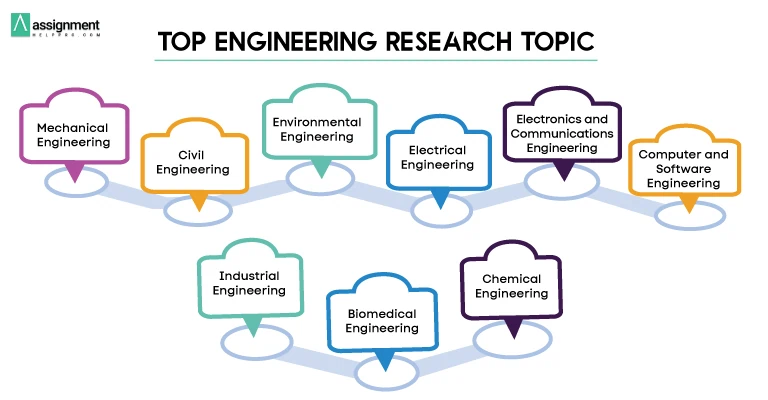
Mechanical Engineering Research Topics
- How does the study of robotics benefit from a mechanical engineering background?
- How can a new composite substitute reduce costs in large heat exchangers?
- Which will become the predominant energy technology this century?
- Why structural analysis is considered the foundation of mechanical engineering?
- Why is cast iron used in the engines of large ships?
- What is the finite element approach and why is it essential?
- Why is the flow of fluids important in mechanical engineering?
- What impact does mechanical engineering have in the medical field?
- How do sports incorporate mechanical engineering theories?
- What is the process of thermal heat transfer in machines?
- How can solar panels reduce energy costs in developing countries?
- In what ways is mechanical engineering at the forefront of the field?
- How do various elements interact differently with energy?
- How can companies improve manufacturing through new mechanical theories?
Additional Research Paper Topics on Mechanical Engineering
- Power generation: Extremely low emission technology.
- Rail and wheel wear during the presence of third-body materials.
- Studying the impact of athletic shoe properties on running performance and injuries
- Evaluating teeth decay using patient-specific tools
- Nanotechnology.
- Describe the newly developed methods and applications in Vibration Systems
- Perspective or general Commentaries on the methods and protocols relevant to the research relating to Vibration Systems
- Software-related technology for Visibility of end-to-end operations for employee and management efficiencies
- What should be the best strategies to apply in the planning for consumer demand and responsiveness using data analytics
- Analysis of the monitoring of manufacturing processes using IOT/AI
- Critical analysis of the advancing digital manufacturing with artificial intelligence (AI) and machine learning (ML) Data Analytics
- Pyrolysis and Oxidation for Production and Consumption of Strongly Oxygenated Hydrocarbons as Chemical Energy Carriers: Explain
- Explore the most effective strategies for fatigue-fracture and failure prevention of automotive engines and the importance of such prevention
- Explore the turbomachinery performance and stability enhancement by means of end-wall flow modification
- Production optimization, engine performance, and tribological characteristics of biofuels and their blends in internal combustion engines as alternative fuels: Explain
Civil Engineering Research Topics
- The use of sustainable materials for construction: design and delivery methods.
- State-of-the-art practice for recycling in the construction industry.
- In-depth research on the wastewater treatment process
- Building Information Modelling in the construction industry
- Research to study the impact of sustainability concepts on organizational growth and development.
- The use of warm-mix asphalt in road construction
- Development of sustainable homes making use of renewable energy sources.
- The role of environmental assessment tools in sustainable construction
- Research to study the properties of concrete to achieve sustainability.
- A high-level review of the barriers and drivers for sustainable buildings in developing countries
- Sustainable technologies for the building construction industry
- Research regarding micromechanics of granular materials.
- Research to set up remote sensing applications to assist in the development of sustainable construction techniques.
- Key factors and risk factors associated with the construction of high-rise buildings.
- Use of a single-phase bridge rectifier
- Hydraulic Engineering: A Brief Overview
- Application of GIS techniques for planetary and space exploration
- Reengineering the manufacturing systems for the future.
- Production Planning and Control.
- Project Management.
- Quality Control and Management.
- Reliability and Maintenance Engineering.
Environmental Engineering Research Paper Topics
- Design and development of a system for measuring the carbon index of energy-intensive companies.
- Improving processes to reduce kWh usage.
- How can water conductivity probes help determine water quality and how can water be reused?
- A study of compressor operations on a forging site and mapping operations to identify and remove energy waste.
- A project to set up ways to measure natural gas flow ultrasonically and identify waste areas.
- Developing a compact device to measure energy use for a household.
- What are carbon credits and how can organizations generate them?
- Production of biogas is from organic coral waste.
- Analyzing the impact of the aviation industry on the environment and the potential ways to reduce it.
- How can voltage reduction devices help organizations achieve efficiency in electricity usage?
- What technologies exist to minimize the waste caused by offshore drilling?
- Identify the ways by which efficient control systems using information systems can be introduced to study the energy usage in a machining factory.
- The process mapping techniques to identify bottlenecks for the supply chain industry.
- Process improvement techniques to identify and remove waste in the automotive industry.
- In what ways do green buildings improve the quality of life?
- Discussion on the need to develop green cities to ensure environmental sustainability
- Process of carbon dioxide sequestration, separation, and utilization
- Development of facilities for wastewater treatment
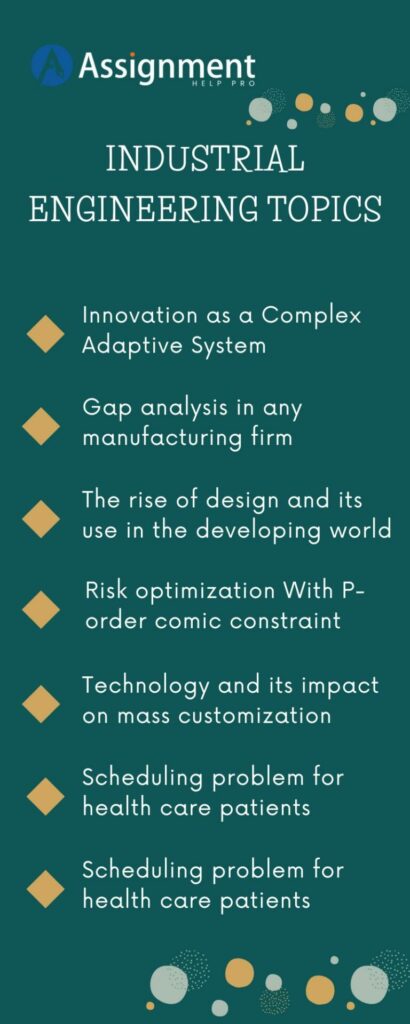
Read more topics: Outstanding Environmental Science Topics for You to Consider
Electrical Engineering Research Topics
- Research to study transformer losses and reduce energy loss.
- How does an ultra-low-power integrated circuit work?
- Setting up a control system to monitor the process usage of compressors.
- Integration of smart metering pulsed outputs with wireless area networks and access to real-time data.
- What are the problems of using semiconductor topology?
- Developing effective strategies and methodical systems for paying as-you-go charging for electric vehicles.
- A detailed review and investigation into the key issues and challenges facing rechargeable lithium batteries.
- Trends and challenges in electric vehicles technologies
- Research to investigate, develop and introduce schemes to ensure efficient energy consumption by electrical machines.
- What is meant by regenerative braking?
- Smart charging of electric vehicles on the motorway
- Research to study metering techniques to control and improve efficiency.
- Develop a scheme to normalize compressor output to kWh.
- Research to introduce smart metering concepts to ensure efficient use of electricity.
- What is the most accurate method of forecasting electric loads?
- Fundamentals of Nanoelectronics
- Use of DC-to-DC converter in DC (Direct Current) power grid
- Development of Microgrid Integration
Electronics and Communications Engineering Research Topics
- Developing the embedded communication system for the national grid to optimize energy usage.
- Improvement of inter-symbol interference in optical communications.
- Defining the boundaries of electrical signals for current electronics systems.
- The limitation of fiber optic communication systems and the possibility of improving their efficiency.
- Gaussian pulse analysis and the improvement of this pulse to reduce errors.
- A study of the various forms of errors and the development of an equalization technique to reduce the error rates in data.
- Realizing the potential of RFID in the improvement of the supply chain.
- Design of high-speed communication circuits that effectively cut down signal noise.
- Radiation in integrated circuits and electronic devices.
- Spectral sensing research for water monitoring applications and frontier science and technology for chemical, biological, and radiological defense.
Computer and Software Engineering Research Topics
- How do businesses benefit from the use of data mining technologies?
- What are the risks of implementing radio-controlled home locks?
- To what extent should humans interact with computer technologies?
- Are financial trading systems operating over the web putting clients at risk?
- What challenges do organizations face with supply chain traceability?
- Do chatbot technologies negatively impact customer service?
- What does the future of computer engineering look like?
- What are the major concepts of software engineering?
- Are fingerprint-based money machines safe to use?
- What are the biggest challenges of using different programming languages?
- The role of risk management in information technology systems of organizations.
- In what ways does MOOD enhancement help software reliability?
- Are fingerprint-based voting systems the way of the future?
- How can one use an AES algorithm for the encryption of images?
- How can biological techniques be applied to software fault detection?
Read more: Creative Capstone Project Ideas For Students
Network and Cybersecurity Engineering Research Topics
- Write about Cybersecurity and malware connection.
- How to detect mobile phone hacking.
- Discuss Network intrusion detection and remedies.
- How to improve network security using attack graph models.
- Explain Modern virus encryption technology.
- Investigate the importance of algorithm encryption.
- Discuss the role of a firewall in securing networks.
- Write about the global cybersecurity strategy.
- Discuss the Privacy and security issues in chatbots.
- Write about Cloud security engineering specifics
Industrial Engineering Research Paper Topics
- The application of lean or Six Sigma in hospitals and services-related industries.
- The use of operation research techniques to reduce cost or improve efficiency.
- Advanced manufacturing techniques like additive manufacturing.
- Innovation as a Complex Adaptive System.
- CAD-based optimization in any manufacturing environment.
- Gap analysis in any manufacturing firm.
- The impact of 3D printing in the manufacturing sector.
- Simulating a real-life manufacturing environment into simulating software
- The rise of design and its use in the developing world.
- Building a network-based methodology to model supply chain systems.
- Risk optimization With P-order comic constraint
- Technology and its impact on mass customization
- How project management becomes more complex with disparate teams and outsourced functions?
- Scheduling problem for health care patients.
Biomedical Engineering Research Ideas
- How does the use of medical imaging help patients with higher risks?
- How can rehabilitation techniques be used to improve a patient’s quality of life?
- In what ways can biomaterials be used to deliver medications more efficiently?
- What impact does medical virtual reality have on a patient’s care?
- What advancements have been made in the field of neural technology?
- How does nanotechnology pave the way for further advancements in this field?
- What is computational biology and how does it impact our lives?
- How accurate are early diagnosis systems in detecting heart diseases?
- What does the future hold for technology-fueled medications?
- What are the guiding principles of biomedical engineering research?
Read more: Top Biology Research Topics for Academic Writing
Chemical Engineering Research Topics
- How can epoxy resins withstand the force generated by a firing gun?
- The use of software affected design aspects in chemical engineering.
- What challenges are there for biochemical engineering to support health?
- The advancements of plastic technology in the last half-century.
- How can chemical technologies be used to diagnose diseases?
- What are the most efficient pathways to the development of biofuels?
- How can charcoal particles be used to filter water in developing countries?
- Increased production of pharmacy drugs in many countries.
- How do complex fluids and polymers create more sustainable machinery?
Miscellaneous Engineering Research Ideas
- Sensing and controlling the intensity of light in LEDs.
- Design and development of a pressure sensor for a solar thermal panel.
- Development of microsensors to measure oil flow rate in tanks.
- How can organizations achieve success by reducing bottlenecks in the supply chain?
- Research to identify efficient logistics operations within a supply chain.
- Developing frameworks for sustainable assessments taking into account eco-engineering measures.
- Research to identify process improvement plans to support business strategies.
- What can engineers do to address the problems with climate change?
- The impact of training on knowledge performance index within the supply chain industry.
- Research to introduce efficiency within information systems and support the timely transfer of knowledge and information.
Final Words
Out of the 150+ engineering research paper topics and ideas suggested in this blog, choose any topic that is convenient for you to conduct research and write about. In case, you have not yet identified a good topic for your engineering research paper, reach out to us immediately. We have numerous PhD-certified experts in various engineering branches to offer help with research paper topic selection, writing, and editing in accordance with your requirements.
Especially, with the support of our scholarly writers, engineering students of all academic levels can complete their assignments on time and achieve the highest possible grades. Furthermore, taking our engineering assignment help would aid you in submitting high-quality and plagiarism-free research papers with proper citations and supporting evidence.

Related Post

220 Amazing Religious Research Paper Topics and Ideas

Read and Understand How to Write a Research Proposal

100+ Controversial Research Topics and Ideas to Focus On
About author.
Jacob Smith
I am an Academic Writer and have affection to share my knowledge through posts’. I do not feel tiredness while research and analyzing the things. Sometime, I write down hundred of research topics as per the students requirements. I want to share solution oriented content to the students.
Leave a Reply Cancel reply
You must be logged in to post a comment.
- Featured Posts
140 Unique Geology Research Topics to Focus On
200+ outstanding world history topics and ideas 2023, 190 excellent ap research topics and ideas, 150+ trending group discussion topics and ideas, 170 funny speech topics to blow the minds of audience, who invented exams learn the history of examination, how to focus on reading 15 effective tips for better concentration, what is a rhetorical analysis essay and how to write it, primary school teacher in australia- eligibility, job role, career options, and salary, 4 steps to build a flawless business letter format, get help instantly.
Raise Your Grades with Assignment Help Pro
List of Civil Engineering Project Topics on Concrete
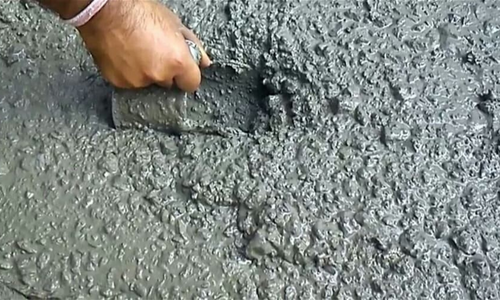
If you are a research student looking to write a thesis or project on concrete for civil engineering students we have compiled a list of some relevant project research topics/ideas on concrete .
Concrete, a term in civil engineering or construction , is a structural material consisting of hard, chemically inert substance known as aggregate (usually sand and gravel) that is held together by water and cement.
As a key component of civil or construction engineering some of your research may be related or in some way have something to do with concrete. So hopefully you find this compilation useful.
If you want to dive in straight away and browse our entire database for civil engineering project topics on concrete projects as well as thesis, dissertations and research papers on concrete, see the below link
- Projects on Concrete for Civil Engineering Students
Some Civil Engineering Research Topics on Concrete
Mechanical Properties of Concrete
The main aim of the research is to study the mechanical properties of concrete and heir effects in concrete stability and failure. He fractures mechanical properties in particular uniaxial tensile strength Ft, young’s modules Eo and fractures energy Gf as sell as the shape of the stress strain and the stress- deformation relation were investigated for high strength and normal strength concrete. | Project | 125 Pages | See Full Document
Effect of Crude Oil Contaminated Sand on the Engineering Properties of Concrete
A considerable fraction of sand in Niger Delta Area of Nigeria is contaminated with crude oil. The contaminated sand is largely utilised by local contractors for the production of concrete. However, there is need to establish its suitability in concreting. Previous works have centered on hardened uncontaminated concrete in crude oil environment but not on concrete made with Crude Oil Contaminated Sand (COCS). This research was designed to evaluate the effect of COCS on some engineering properties of fresh and hardened COCS concrete. | 160 Pages | Thesis | See Full Material
Strength And Microstructure Of Lateritic Concrete Containing Palm Kernel Shell (Pks) As Partial Replacement For Coarse Aggregates
This research work reports the investigation carried out to determine the strength and microstructure of lateritic concrete containing palm kernel shell (PKS) as partial replacement of coarse aggregates. The study employed different mix proportions, which resulted in casting and testing 148 cubes at 7, 14, 21, 28, 60, and 90-days of curing, to determine the best and economic proportion that will give compressive strength. | 72 Pages | Thesis | See Full Material
Comparative Study On The Strength Of Lightweight Foamed Concrete Using Different Reagents (Lithofoam & Sodium Lauryl Sulphate)
This project presents the results of the investigation conducted on a lightweight foamed concrete using different reagents; Sodium Lauryl Sulphate (SLS) and Lithofoam, with a view to determining its potential as a construction material in Nigeria. The properties investigated on the foamed concrete having target density of 1800kg/m3 were: workability, bulk density and compressive strength. | 66 Pages | Project | See Full Material
Enhancing Concrete Properties with the Use of Coconut (coir) Fibers and Admixture
In countries where industrialization is on the rise there is a corresponding increase in waste production resulting from industries which eventually upsets the environment and community for which they provide. While most of these waste generated are hazardous and should be managed, others could be put to appropriate use either directly or after been recycled. | 76 Pages | Project | See Full Material
Use Of Recycled Concrete As Coarse Aggregate For High Strength Concrete
This study is concerned with the production of high strength concrete using recycled concrete aggregates as alternative to natural aggregates. The study includes also the determination of the proportions, characteristics and components of concrete mixes required for production and use in multiple applications at suitable prices. | 116 Pages | Thesis | See Full Material
Comparative Study of Strength of Truss Reinforced Concrete Beam and Conventional Reinforced Concrete Beam
This work presents comparative study of strength of truss reinforced concrete beam and conventional reinforced concrete beam. Two sets of 0.15 x 0.15 x 1m beams were cast. One set was cast using truss as a system of reinforcement at spacing of 100mm, 150mm and 200mm. The other set was cast using longitudinal bars and links at spacing of 100mm, 150mm, and 200mm as the conventional reinforcement. In all 27 truss and 27 conventional reinforcement beams were cast. | 170 pages | Thesis | See Full Material
Some Later Days Structural Properties Of Concrete Containing Palm Oil Empty Bunch Ash (Poeba) As Partial Replacement Of Cement In Concrete
In an attempt to reduced non-renewable material usage, reduce green-house substances and at the same time be relevant to our environment, this research presents the progress of investigation going on to evaluate some properties of POEBA as partial replacement of cement in the production of structural concrete. This research work is carried out to determine the properties of Palm Oil Empty Bunch Ash (POEBA) when used as partial replacement for Ordinary Portland Cement (OPC) in concrete | 70 pages | Project | See Full Material
Investigation Of The Structural Characteristics Of Lime-cement Concrete
This work investigated the structural characteristics of lime cement concrete using 30 selected mix ratios. The properties studied include, compressive strength, flexural strength, splitting tensile strength, shear strength, poisson ratio, modulus of elasticity, and modulus of rigidity. A total of 360 concrete cube specimen, 360 concrete prototype beam specimen, and 360 concrete cylinder specimen were cast and cured in open water tanks. 3 specimen were cast for each mix proportion. | 282 pages | Thesis | See Full Material
Strength Assessment of No-Fines Concrete Pavement
The purpose of this project work is to assess the strength of No-fines concrete pavement. No-Fines concrete is use in low traffic volume, pathways, sidewalk and parking lots. No-fines concrete is produced by using ordinary Portland cement, coarse aggregates, and water. In this study, Two (2) batches of no-fines concrete each with two different water – cement ratio 0.36 and 0.45 and cement – coarse aggregate 1:4 and 1:6 were prepared to find the mix that generated high compressive strength and splitting tensile strength | 79 Pages | Project | See Full Materials
Effect Of Using Basalt And Limestone As Coarse Aggregate In Concrete Mixtures
In this study, concrete mixtures were tested to effect of basalt and limestone as coarse aggregate and evaluate their efficiency on fresh and hardened concrete to achieve the design compressive strengths of [25N/mm2]. By using different proportions is 25%, 50%, 75% and100 %from the weight of coarse aggregate. The study was carried out for 6 types of concrete mixes designed by British Standard, compressive strength of concrete and workability were measured in the reconstruction of maturing for ( 7, 28 and 56) days. | 85 pages | Thesis | See Full Material
Rice Husk Ash And Grinded Rice Husk Effect On The Compressive Strength And Workability Of Concrete
The importance of concrete in modem society cannot be underestimated. There is no escaping from the impact of concrete on everyday life. Concrete is a composite material which is made of filler and a binder. Typical concrete is a mixture of fine aggregate (sand), coarse aggregate (rock), cement, and water. Nowadays the usage of concrete is increasing from time to time due to the rapid development of construction industry. | 71 Pages | Project | See Full Material
The Effect of Silica Fume (S.F) on the Properties of Fresh and Hardened Concrete
Concrete is a composite material consisting of aggregates enclosed in a matrix of cement paste including possible pozzolans, has two major components, cement paste and aggregates. The strength of concrete depends upon the strength of these components, their deformation properties, and the adhesion between the paste and aggregate surface [ 1 ]. In recent years, the construction industry has shown significant interest in the use of high strength concrete (HSC), in applications such as dams, bridges and high rise buildings. | 84 pages | Thesis | See Full Material
Structural Performance Of Lateritic Concrete Containing Palm Kernel Shell (PKS) As A Partial Replacement Of Coarse Aggregate
Sand has traditionally been used as fine aggregate in structural concrete. It is usually imported from relatively distant places at high costs, and this increases the overall cost of making concrete and of providing housing in various Nigerian communities. This study investigates the performance of 409/o of laterite as fine aggregate in place of sand, and specifically seeks to determine whether lateritic concrete containing pies would satisfy the minimum compressive strength requirement of BS 8110 (1997) for use in reinforced concrete works, which is 25 N/mm. | 75 Pages | Project | See Full Material
More Research Resources on Concrete in Civil Engineering
- Thesis, Dissertations & Projects on Concrete in Civil Engineering
- Seminars, Papers, Articles on Concrete in Civil Engineering
Share this:
Leave a comment cancel reply.
Your email address will not be published. Required fields are marked *
Notify me of follow-up comments by email.
Notify me of new posts by email.
This site uses Akismet to reduce spam. Learn how your comment data is processed .
- How we work
55 Engineering Research Paper Topics Worth Your Attention
Stuck with engineering research topics for your proposal? Have a look at ours and get inspired effectively!

Let’s Pick up the Most Exciting Engineering Research Topics
The main feature of engineering topics for research paper and related projects is that they mostly offer practical solutions to a specific problem. Purely theoretical engineering research is less common and is usually done only to challenge existing knowledge, theories & concepts. Which topic to choose is up to you. However, our seasoned experts would like to share some insights on how to write an engineering proposal to help you create papers that will not only earn excellent reviews from your academic advisors but also inspire you to make breakthroughs in your field.
Some Expert Insights on How to Write an Engineering Proposal
The proposal is a paper representing your project from a research angle. It should include as much information about your investigations as possible, including study plans, methods, expected outcomes, etc. Regarding revealing engineering topics, experts from our proposal writing services often recommend focusing on their impact on the current field knowledgebase and practicality if it comes to engineering application solutions development.

Important note! Adding graphics, schemes, images, and any other visuals will be especially beneficial in your engineering research project papers. It helps you reveal more topic details and add value to your PhD research proposal engineering.
How to Reveal Engineering Research Paper Topics With a Paper Structure
Remember also to stick a paper to a given structure:
- Introduction. Review the engineering topic you choose and reveal its importance. Here, you can also give a short overview of what is included in the proposal.
- Qualifications. This section is set to show you have the required skills and capabilities to conduct your research successfully. For example, if it’s a research proposal in mechanical engineering, you may mention some physical aspects of objects you will investigate.
- The background is where you discuss the topic and the problem motivating you to take it. Show how you understand the issue, its impact & causes. If it’s a research proposal for mathematics or another theoretical one, your investigation will probably be based on a theory or concept.
- The schedule section informs paper readers about the time frame you set to complete the work so they understand when to expect the result and what milestones you should go through in revealing your engineering research paper topics.
- The proposal statement is the section where you tell what exactly you are proposing regarding the topic and what you aren’t, giving readers additional information about your work. This is especially valuable if you plan to join engineering research in Princeton University or other prestigious institutions.
- Costs. This paper section shows how many resources your project requires (especially vital if it needs additional funding). The best way to do it is to divide expenses into categories and calculate the totals for each category. E.g., hardware & software, auxiliary tools, etc., if it comes to working on PhD topics in computer science or other application solutions.
- Research methodology. In PhD research proposal mechanical engineering, you present how exactly you will complete the work, discussing steps you take during the working process.
- The results section is aimed at showcasing the proposal’s outcomes. For example, if you work with research proposal topics in mechanical engineering, you can present a concept of an electronic device or offer a problem solution.
Research Proposal Topics in Electronics Engineering
It’s time to get more specific and actual topic samples. First, we will go with research proposal topics in electronics engineering.
- Understanding Effective Power Electronics Using Circuit Simulation
- Redesign of AC Electrical Motors
- Electric Vehicle Motors and Gearbox
- Benefits of Optimization in Electrical Engineering
- Electric Vehicles – A Solution to Global Pollution
- Effects of Standard Deviation on Time and Frequency Response of Gaussian Filter
- Impact of Surface on Nano-Beam Mechanical Behaviors
- Maximum Power Point Tracking Based on Differential Conductance
- Analyzing Mechanical Property of Electrically Assisted Friction Stir Welding
- High Throughput Droplet Actuation Platform
- Numerical Analysis of Mechanical Characteristics of Joint Structure of Steel Pipe Sheet Pile Foundation
- Implementation of an Improved Automatic DC Motor Speed Control Systems Using Microcontrollers
- Automated Hybrid Smart Door Control System
- Comprehensive Review of Smart Grid Ecosystem
- Solar Simulators’ Trends Overview
- Intelligent Voice Controlled Wheel Chair: Design and Implementation
- Comparative of Field Effect Transistor (FET) and Bipolar Power Transistor Performance in Amplifiers
- Development of a Low-Cost Automatic Internet of Things Extension System
- Mechanical Analysis of Thin-Walled Cylindrical Shells With Cracks
17 Great Research Proposal Topics for Civil Engineering
The civil engineering field focuses on improving infrastructure and environmental sustainability. By discovering new research ideas and presenting unique research proposal topics for civil engineering, civil engineers are able to resolve problems people couldn’t deal with before.
- Studying the Effects of Urbanization on Biodiversity
- Analyzing the Effects of Water Scarcity on Infrastructure and the Environment
- Evaluating the Feasibility of Using Drones in Construction
- Assessing the Feasibility of Using Prefabrication in Construction
- Evaluating the Effectiveness of Public Transportation Systems in Reducing Carbon Emissions
- The Impacts of Infrastructure on Local Economies
- Investigating the Use of Big Data in Civil Engineering
- Impact of Ripe and Unripe Plantain Peel Ash on Strength Properties of Concrete
- The Effects of Water Scarcity on Infrastructure and the Environment
- The Effects of Natural Disasters on Transportation Infrastructure
- Evaluating the Feasibility of Using Robots in Construction
- Evaluating the Effectiveness of Sustainable Transportation Infrastructure
- Investigating the Use of Blockchain Technology in Civil Engineering
- Structural Characteristics of Soilcrete Blocks
- The Use of Augmented Reality (AR) In Civil Engineering
- Evaluating the Effectiveness of Sustainable Drainage Systems (SUDs)
- Analyzing the Effects of Climate Change on Infrastructure Materials
Some Good Research Proposal Topics in Mechanical Engineering
With a solid number of topics for engineering research papers in mechanics, choosing the central theme for your research will be easier. Even if you already know what area to investigate, having several research paper topics for engineering allows you to decide from which angle you will approach the issue.
- Energy and Exergy Analysis of Boiler Systems
- Effect of Delay Period on Performance of Compression Engine Running on Jatropha Fuel
- Optimum Buckling Response Model of Grp Composites
- Experimental Performance Evaluation of Charcoal-Stove
- The Detail Fabrication of a Candle Moulding Machine
- Fabrication of Metal Panel Door
- Electricity Generation Using Propeller Shaft
- The Cavitation Effect in Centrifugal Pumps
- Development of a Gas Propelled Rocket Engine
- Research on Methods for Recycling Spent Fuel for Internal Combustion Engines
- Study of Changes in the Characteristics of the Al-6’1/OCU Alloy after Annealing Process
- The Development of a Pumping Machine for Water Distribution in a High-Rise Building
- 3D Printing in the Construction of Water Supply Systems
- Repair and Rehabilitation of Faulty Air Condition
- Design and Analysis of a Microsatellite Structure in Lowearth Orbit
- A Study of Cavitation in Pumps and Flow Systems
- Design and Construction of a Digital Clock
- Effect of Injector Nozzle Holes on Diesel Engine
- Effect of Vortex in Kaplan Turbine-Using Cfd a Case Study: Rosseries Power Plant
Download Here More Engineering Research Proposal Ideas!
Get help working on engineering topics for research paper.
Working on some engineering research topics may be challenging for students needing a lot of time and effort to present qualitative proposals when they often have many other responsibilities. And this is where hiring qualified proposal writers may save them much effort. Delegating the work on your research topics to an expert makes your student’s life much easier, allowing quality outcomes with minimal time.
Specialists also know what topic information should be added to your paper and how it should be formatted. Just specify your needs and requirements and mention the main purpose for writing engineering proposal. Everything will be done well at the appointed time, so there will be no need to worry about anything. Check the list of our proposal topics and ensure you choose the most interesting one.
Take the experts’ assistance and wait a little for a paper leading to your research project approval!

Upload Files
Thank you for your request!
We will get in touch with you shortly!
Please, try one more time.
School of Engineering
Guide to writing a research proposal for an engineering phd.
An important part of your PhD application is the research proposal so we want to know what your research interests are so that we may direct your application to potential supervisors. The proposal does not need be long, but the quality should be high and no more than 2-3 pages should be sufficient. Ideally your proposal should address the points below however as long as we get a clear idea of your research interests then we can consider your application.
- Ensure that your research interests match those in the School of Engineering.
- Outline the main objectives of your research, providing details of two or three key aspects.
- State your target audience for this project.
- Explain what the main outcomes of the project are that you would want to see.
- Outline what methods/approaches you intend to use to achieve the aims of your project.
- Indicate your suggested data collection procedures, including sources and any possible difficulties.
- Explain any analytical techniques you intend to use for your research.
- Broad research areas which would be unmanageable as a PhD topic or that have no relevance to the University of Warwick research areas.
- Vague descriptions of your research interests.
Top Civil Engineering Project Topics For Final Year Students
Are you looking for civil engineering project topics? Check out this article.
Civil Engineering Project Topics For Final Year Students:
Projects are a compulsory subject for every engineering student. As a civil engineering student, you must submit a project in the final year with a group or as an individual.
Many civil engineering students have been requested to write an article on civil engineering project topics. Because they have no idea which one to choose. Here I have tried to cover some most important civil engineering project topics for final-year students. Have a look.
Surveying & Levelling :
Advertisement
- Advance Technology in Surveying .
- Development Of Remote Monitoring System For Civil Engineering.
Building Construction :
Building construction is one of the largest sectors in civil engineering, you can prepare various projects according to the topics.
- Advanced construction techniques.
- Rotating building.
- Green buildings.
- The rain roof water-harvesting system.
- Analysis of seismic retrofitting of buildings.
- Causes, prevention, and repair of cracks In buildings.
- Zero energy buildings .
- Stability of high-rise buildings .
- Corrosion Mechanism, Prevention & Repair Measures of RCC Structure.
- Rehabilitation techniques.
- Laminated flooring.
- Types of formwork & design.
- Rectification of building tilt.
- Space hotel.
- Retrofitting using FRP laminates.
- Collapse of World Trade Center.
- Impact of lightning on building and remedial measures.
- Passive solar energy buildings.
Structure Analysis & Design :
Here are some important structural engineering project topics you can select in your final year of civil engineering.
- Advanced Earthquake Resistant Techniques.
- Earthquake vibration control using the modified frame- shear wall .
- Failure of foundation due to earthquake.
- Building analysis with soft-storey effect.
- A project on confined masonry
- R.C.C cube test with different grades and mixtures.
- FE Analysis of lateral buckling.
- Energy dissipation devices for seismic design.
- Reservoir induced seismicity.
- Seismic isolation devices.
Engineering Materials:
- Smart materials.
- Bamboo as a building material .
- Cellular Lightweight Concrete .
- Non-destructive testing of concrete ( UPV Test ).
- Mineral admixtures for high-performance concrete.
- Glass fiber reinforced concrete .
- Geosynthetics.
- Silica fume concrete.
- Fly-ash concrete pavement .
- Basalt rock fiber (brf).
Highway & Transportation Engineering :
Highway and transportation is a good sub-branch in civil engineering, you can choose from the below project topics for your final year.
- Automated highway systems.
- Intelligent transport system.
- Signal design.
- Highway safety.
- Advanced Pavement Design.
- Flexible pavement .
- Rural road development.
- Mixed traffic control & behavior continuously reinforced concrete pavement.
Soil Mechanics & Geotechnical Engineering :
- Pile foundation .
- Ground improvement techniques .
- Soil Liquefaction.
- Improvement of bearing capacity of sandy soil by grouting .
- Erosion control in slope.
- Use of plastic as soil stabilizer.
Irrigation & Water Resources Engineering :
- Water resources engineering.
- Watershed management.
- Application of software in civil engineering industry Computer.
- Application In Civil Engineering-ANN.
- Arsenic Removal From Ground Water By Coagulation Process.
- Concrete Cube Testing – A Neural Network Approach, Using MATLAB 6.0.
- Geometry Optimization of Space Frame Structures .
- Application of remote sensing & g.i.s. in groundwater prospecting.
- Hydraulic & hydrological impacts on Bridge .
- Interlinking of rivers.
- Rainwater Harvesting Methods
Environmental Engineering :
If you love environmental engineering there are also some good civil engineering project topics as follows.
- Air pollution & its control.
- Sewage treatment plant.
- Marine pollution.
- E-waste disposal.
- Environmental Impact assessment.
- Logistic management of solid waste.
Software And Computer Applications :
- GIS, GPS and its applications.
Civil Engineering Projects Sample:

Do you know any other good civil engineering project topics? Let me know in the comments.
Civil Engineering Interview Questions (Top 70)
Main focal points of civil site engineers, difference between site engineer & supervisor.
How To Become A Successful Civil Engineer
Top 10 Branches In Civil Engineering
Follow our Facebook Page , Linkedin Page & Telegram Channel .
Share this:

6 thoughts on “Top Civil Engineering Project Topics For Final Year Students”
Hello, Can you suggest the topic for the m.tech structural engineering students.
I have completed my b.tech in civil engineering and I am looking for MS in Australia can you give any suggestions that which will be better to do and that will be having better scope in future?
I’m studying bachelor degree in civil engineering. I need topic suggestion in Irrigation &WATER Resources Engineering and Environmental Engineering.
Interesting. What project can be good for final student doing bachelor of Civil Engineering about highway/transportation?
What are some of project titles that are concern with the effects of lime content on CBR and PI
What are the other topics of project for the engineering survey ??and its propose titles
Comments are closed.
- Skip to primary navigation
- Skip to main content
- Skip to primary sidebar
Engineering Management Institute
TCEP 191: What Civil Engineers Need to Know About Proposal Writing
December 29, 2021 By EMI
document.createElement('audio'); https://media.blubrry.com/engineeringcareercoach/traffic.libsyn.com/secure/civilengineeringpodcast/TCEP191.mp3 Podcast: Play in new window | Download | Embed
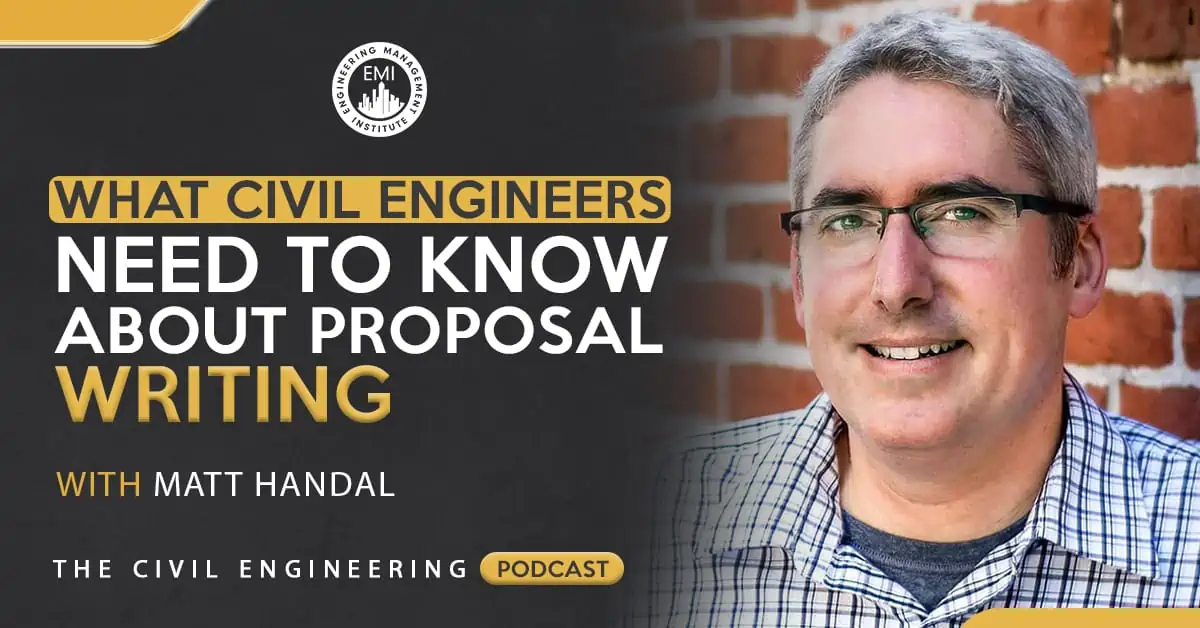
In this episode, I talk to Matt Handal, a proposal expert and author of the book called “ Proposal Development Secrets: Win More, Work Smarter, and Get Home on Time ,” about proposal writing for engineers. He share some great tips that you can use as a working engineer to get better at this process.
Engineering Quotes:

Here Are Some of the Questions We Ask Matt :
- What led you to write the book “ Proposal Development Secrets: Win More, Work Smarter, and Get Home on Time ”?
- How should you work with the marketing staff or other people who help put proposals together?
- What if you have too much billable work to engage with a proposal effort?
- How can engineers make their lives easier when writing proposals?
- What is the biggest mistake found in technical approaches?
- What is it like to be on an evaluation committee for a civil engineering contract?
- Do you have any final advice for civil engineers out there?
Here Are Some Key Points Discussed in This Episode About Proposal Writing:
- Matt wrote the book, “Proposal Development Secrets,” because he saw a problem with proposal writing in the engineering industry, and he wanted to help solve this problem. Proposal writers were overworked and working on holidays and late at night.
- You do not learn about proposal writing in engineering school. At some point in your civil engineering career, you will be asked to write a proposal that could win a contract for the company. Putting engineers who have no marketing experience in this position can be unfair. The marketing team was also not taught how to respond to an RFP (request for proposal). This often makes proposals a painful experience. Engineers and marketers are put into the same boat, when engineers should really be the marketers’ advocates, which can be achieved by arranging training for them, taking them on site visits, and listening to them when they do not agree on something. Give the marketing team more responsibility by allowing them to write the first version of the cover letter. You must help them to help you. Engineers and marketers must help each other to be accountable to things like their deadlines.
- If you are asked to write a proposal but have too much billable work, you cannot assume that other people know and understand your commitments and workload. You must communicate your commitments and workload and suggest other alternatives. It is better to let them know when the RFP lands on your desk, not the day before the deadline or not even deliver it. Always ask for help when you need it. Remember that if you want to progress in your career quicker, you must get good at winning work for the company.
- Civil engineers can make their proposal writing easier by asking senior management for proposal writing training for both the marketing team and engineers. Understand that there is a difference between what you can do and what you can win. Engineers must pursue contracts that they can win. You must get a “go / no go” system in place to know if you stand a reasonable chance to win the contracts before writing the proposal.
- The biggest mistake found in technical approaches to proposals is that they are devoid of a technical approach. The technical approach is often unknowingly replaced by the scope of work and many promises. A technical approach should be comprised of how you are going to do the work, why you are going to do it that way, and what the benefit is to the client.
- Being on an evaluation committee for a civil engineering contract can be an eye-opening experience. You will find that some of the things that you thought were important are not as important and vice versa. You will get an insight into how you would evaluate the proposals if you were on a selection committee.
- Civil engineers can contact Matt if they have any questions, and he will provide advice where he can.
More Details in This Episode…
About matt handal.

Books Mentioned in This Episode:
Proposal Development Secrets: Win More, Work Smarter, and Get Home on Time

The Magic of Winning Proposals

Sources/References:
Help Everybody Everyday Connect with Matt Handal on LinkedIn
We would love to hear any questions you might have or stories you can share on what you think civil engineers need to know about proposal writing.
Please leave your comments, feedback, or questions in the section below.
- If you enjoyed this post, please consider downloading our free list of 33 Productivity Routines of Top Engineering Executives. Click the button below to download. Download the Productivity Routines
To your success,
Anthony Fasano, P.E., LEED AP Engineering Management Institute Author of Engineer Your Own Success
Related Posts
- TCEP 118: Information Civil Engineers Should Seek Up-Front for Proposal Writing Success
- TCEP 047: Keeping Young Civil Engineers Billable
- TCEP 105: From Civil Engineering to Helping Civil Engineers in Texas Every Day
- TCEP 020: Business Development for Smart Civil Engineers
- TCEP 098: Management Skills that Civil Engineers Should Build

ENGINEERING MANAGEMENT INSTITUTE
We can help you:.
- Build solutions to attract talented professionals.
- Develop your staff’s people skills.
- Create career roadmaps for your staff.
- Provide PM training for your professionals.
- Build custom development programs.
- Scale sustainably.
50 E. Ridgewood Avenue #129
Ridgewood NJ, 07450
800-920-4007

SPECIAL DOWNLOAD
33 Productivity Routines of Top Engineering Executives

- Students Projects
- Accomodation
- Career Services
- Financial Aid Services and Scholarships
- Guiding and Counselling
- Health Services
- International Students
- Online Learning
- PWD Services
- Student Organizations
- Academic Staff
- Technical Staff
- Administrative Staff
- Support Staff
- Register as Alumni
- Civil Engineering Facilities
- Facility Equipment
- Thesis Submission
- Achievements &Milestones
- Historical Photo Gallery
- Historical Projects
- Luminary Guests
- Staff Convocation List

© University of Nairobi 2024. All rights Reserved.

IMAGES
VIDEO
COMMENTS
200+ Civil Engineering Research Topics: Exploring Promising Topics. Civil engineering research is the driving force behind the development of sustainable infrastructure and innovative construction methods. It plays a crucial role in shaping our world, from designing earthquake-resistant buildings to developing advanced transportation systems.
COVID-19 Civil Engineering Research Topics. Topic 1: Civil engineering after Coronavirus: Identify the consequences of Covid-19 on civil engineering in the UK or any country of your choice. Topic 2: Research to study the damage caused to the construction projects due to the lack of workers on site. Topic 3: Contractors and Builders after COVID ...
Railway Civil Engineering Research Topics For Undergraduates. High-speed rail technology: Infrastructure design and operational challenges. Rail track maintenance and performance enhancement techniques. Energy efficiency in rail transportation systems. Integration of magnetic levitation technology in railway networks.
Here are the top 100 Research ideas in civil engineering: Optimization of building information modeling (BIM) for search engines. Analyzing the effects of traffic on urban air quality. Evaluating the feasibility of green infrastructure for stormwater management. Developing sustainable construction techniques for high-rise buildings.
Civil engineering is the design and fabrication of structures for improving the way we live and work and for enabling rapid, safe and high-volume transportation. Examples include building roads ...
The mission of the Boise State University Department of Civil Engineering is to be accomplished through undergraduate teaching, graduate studies and research. These goals will be achieved through a balance of teaching and technical assistance to local and regional industry and government agencies. Civil engineering is critical to our modern way of life.
Selection of Suitable Civil Engineering Research Topics for Undergraduates. We have compiled a sample list of latest research topics in civil engineering. You can check them out or go through the entire civil engineering research topic list. (1) Integrated Solar and Hydraulic Jump Enhanced Waste Stabilization Pond.
New Technologies in Short Span Bridges: A Study of Three Innovative Systems, Andrew Lahovich, Civil Engineering. PDF. Driver Dynamics and the Longitudinal Control Model, Gabriel G. Leiner, Civil Engineering. PDF. Interfacial Strength Between Prestressed Hollow Core Slabs and Cast-in-Place Concrete Toppings, Ryan M. Mones, Civil Engineering. PDF
This makes this topic essential in Civil Engineering. Download Free PDF View PDF. Proceedings of International Structural Engineering and Construction. Improving Construction Project Performance in Developing Countries: Contractor Approach. Samuel A D E N I Y I Adekunle. ... A Research Proposal on the Success Factors in Civil Engineering ...
This effectively communicates the project's value proposition. 2. Select the Right Team Members. The success of a civil engineering project is largely dependent on the expertise, coordination, and collaboration of its project team. Therefore, include a section that outlines the team responsible for bringing the project to life.
Research Discussions in Civil Engineering | Explore the latest full-text research PDFs, articles, conference papers, preprints and more on CIVIL ENGINEERING. Find methods information, sources ...
The Research Proposal As the student develops a research topic in conjunction with her advisor, she/he needs to begin thinking about preparing a research proposal. Graduate research proposals are formal documents and should be written as though they were to be submitted to a funding agency. There are two objectives to be accomplished in the ...
Dear Ahsan. Based on the related data generated by Department of Civil Engineering Indian Institute of Science (your country) there are so many new topics in Civil Engineering including ...
Covid-19 Civil Engineering Research Topics. Construction Engineering after Coronavirus: Identify the consequences of Covid-19 on construction engineering in the UK or any country of your choice. ... ResearchProspect is a UK based academic writing service that provides help with Dissertation Proposal Writing, ...
Civil Engineering Research Topics. The use of sustainable materials for construction: design and delivery methods. State-of-the-art practice for recycling in the construction industry. In-depth research on the wastewater treatment process. Building Information Modelling in the construction industry.
Some Civil Engineering Research Topics on Concrete. Mechanical Properties of Concrete. The main aim of the research is to study the mechanical properties of concrete and heir effects in concrete stability and failure. He fractures mechanical properties in particular uniaxial tensile strength Ft, young's modules Eo and fractures energy Gf as ...
The purpose of this r esearch is to d etermine how e xisting constr uctions, in this. instance a "T-beam," function by using various measurement techniques, published. experimental data, and ...
17 Great Research Proposal Topics for Civil Engineering. The civil engineering field focuses on improving infrastructure and environmental sustainability. By discovering new research ideas and presenting unique research proposal topics for civil engineering, civil engineers are able to resolve problems people couldn't deal with before.
Outline the main objectives of your research, providing details of two or three key aspects. State your target audience for this project. Explain what the main outcomes of the project are that you would want to see. Outline what methods/approaches you intend to use to achieve the aims of your project. Indicate your suggested data collection ...
50+ civil engineering research topics for undergraduates. 1). Effects of the Addition of Carbide on Sewage Degradation. 2). The Effect Of Reinforced Concrete On the Safety Of Residential Buildings In Cameroon. 3). A Study on Bacterial Concrete. 4).
Here are some important structural engineering project topics you can select in your final year of civil engineering. Advanced Earthquake Resistant Techniques. Earthquake vibration control using the modified frame- shear wall. Failure of foundation due to earthquake. Building analysis with soft-storey effect.
Engineers and marketers must help each other to be accountable to things like their deadlines. If you are asked to write a proposal but have too much billable work, you cannot assume that other people know and understand your commitments and workload. You must communicate your commitments and workload and suggest other alternatives.
P. O. Box 30197 - 00100, NAIROBI, KENYA. Located at Main Campus. Civil Engineering Block (Next to Central Police Station) Harry Thuku Way, Nairobi. Nairobi City County. Kenya. Tel: +254 - 20 - 491- 3512 Email: [email protected]